Douma National Hospital takes shape again with support from Japan
27 November 2025, Rural Damascus, Syrian Arab Republic – On a quiet street in Douma, a large hospital complex is almost ready for the day it will welcome patients again. For now, its corridors are still, but inside, teams from the Ministry of Health, the Rural Damascus Health Directorate and the World Health Organization (WHO) are completing final checks on a hospital that once served as a lifeline for communities across eastern Ghouta.
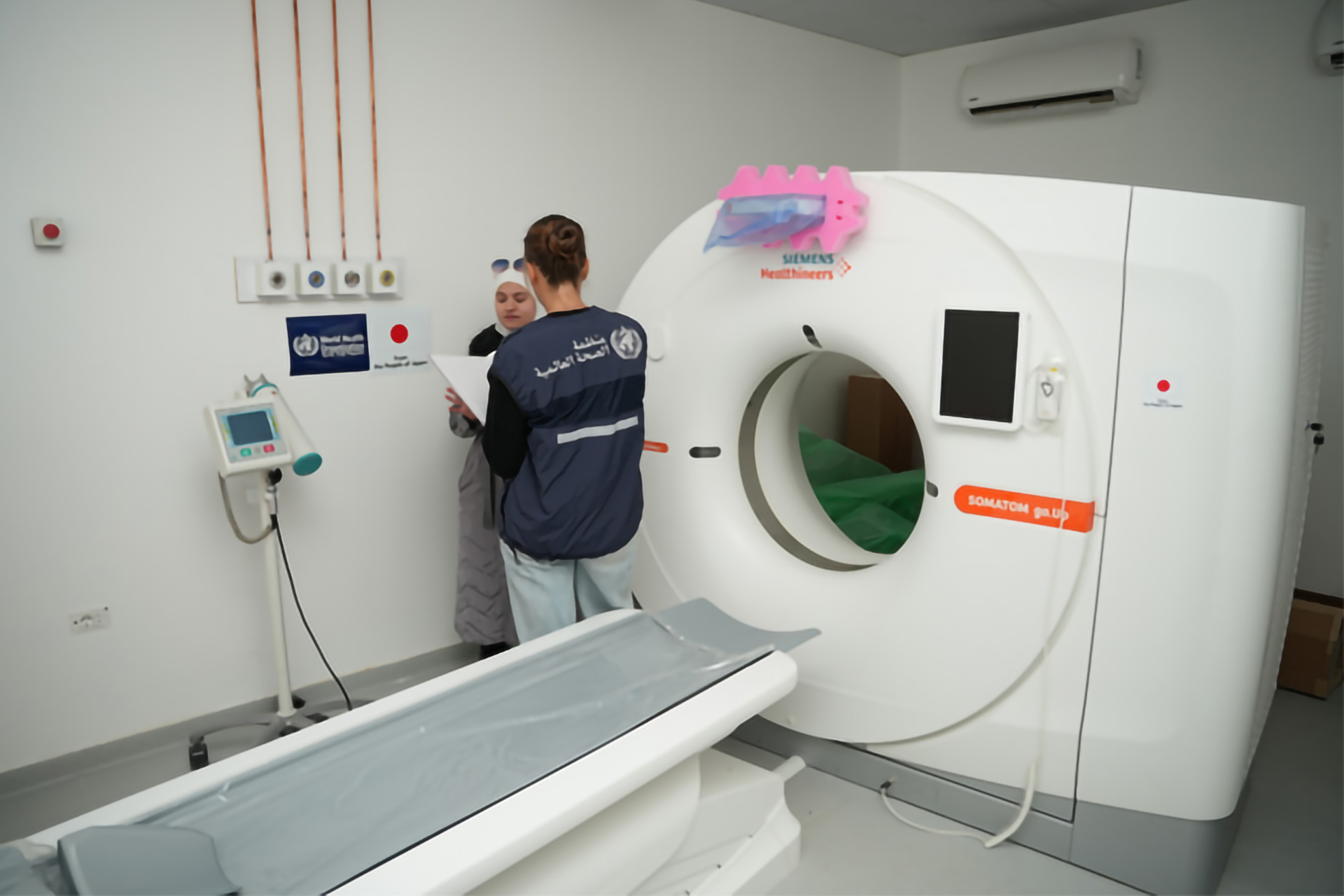 A biomedical engineer reviews the installation of new diagnostic equipment at Douma National Hospital. Photo credit: WHO
A biomedical engineer reviews the installation of new diagnostic equipment at Douma National Hospital. Photo credit: WHO
Before it was damaged during years of fierce hostilities, Douma National Hospital was the main referral hospital for the area, receiving patients from across eastern Ghouta and parts of Rural Damascus. With 175 beds and 10 operating rooms, it offered a wide range of surgical and medical services. Since 2012, however, the hospital has been out of service, and people in the area have had to rely on a small emergency facility with a single operating room and just two inpatient beds.
Today, the rehabilitation and equipping of Douma National Hospital is nearing completion. Under the leadership of the Ministry of Health and the Rural Damascus Health Directorate, and with support from WHO, the hospital has been structurally repaired and redesigned to restore safe services for around 550 000 people in Douma and an estimated 3 million people in surrounding areas. This work has been made possible thanks to support from the Government of Japan.
A hospital prepared for safer, more specialized care
The rehabilitated and newly equipped complex now consists of two main blocks and upgraded site infrastructure. Block A will function as a specialized women’s and children’s hospital, with around 30 beds. It includes two operating rooms (one general and one maternity), labour and post-operative recovery rooms, a fully equipped laboratory, an intensive care unit, a neonatal care unit and a paediatric ward. Imaging services will include mammography, X-ray and obstetric–gynecologic ultrasound.
Block B will host a general emergency department, designed to stabilize urgent cases closer to home. It will feature an emergency operating room, emergency intensive care beds, CT scanning, digital and mobile X-rays, ultrasound and a fully equipped emergency laboratory, alongside clinics and administrative rooms.
“We are now in the final stages of preparing the hospital to resume services,” says Dr Mwaz Anwar Sidoi, general and vascular surgeon and Director of Douma National Hospital. “Once it is staffed, the hospital will again be able to receive most emergency cases – from obstetrics and paediatrics to internal medicine and trauma – and reduce the need for patients to travel long distances for care.”
Built with safety, accessibility and future needs in mind
From the beginning, rehabilitation has focused on safety and quality. New layouts and systems have been designed to improve infection prevention and control, with dedicated sterilization areas, better patient flows, and safer working conditions for staff.
“Once Douma National Hospital resumes services, there will be clear procedures in place to control infection and protect both patients and health workers,” explains Dr Sidoi. “Plans include having a specialized sterilization team, training staff on personal protection and safe management of critical cases and ensuring regular vaccination and health checks for medical staff.”
Local engineers at the heart of recovery
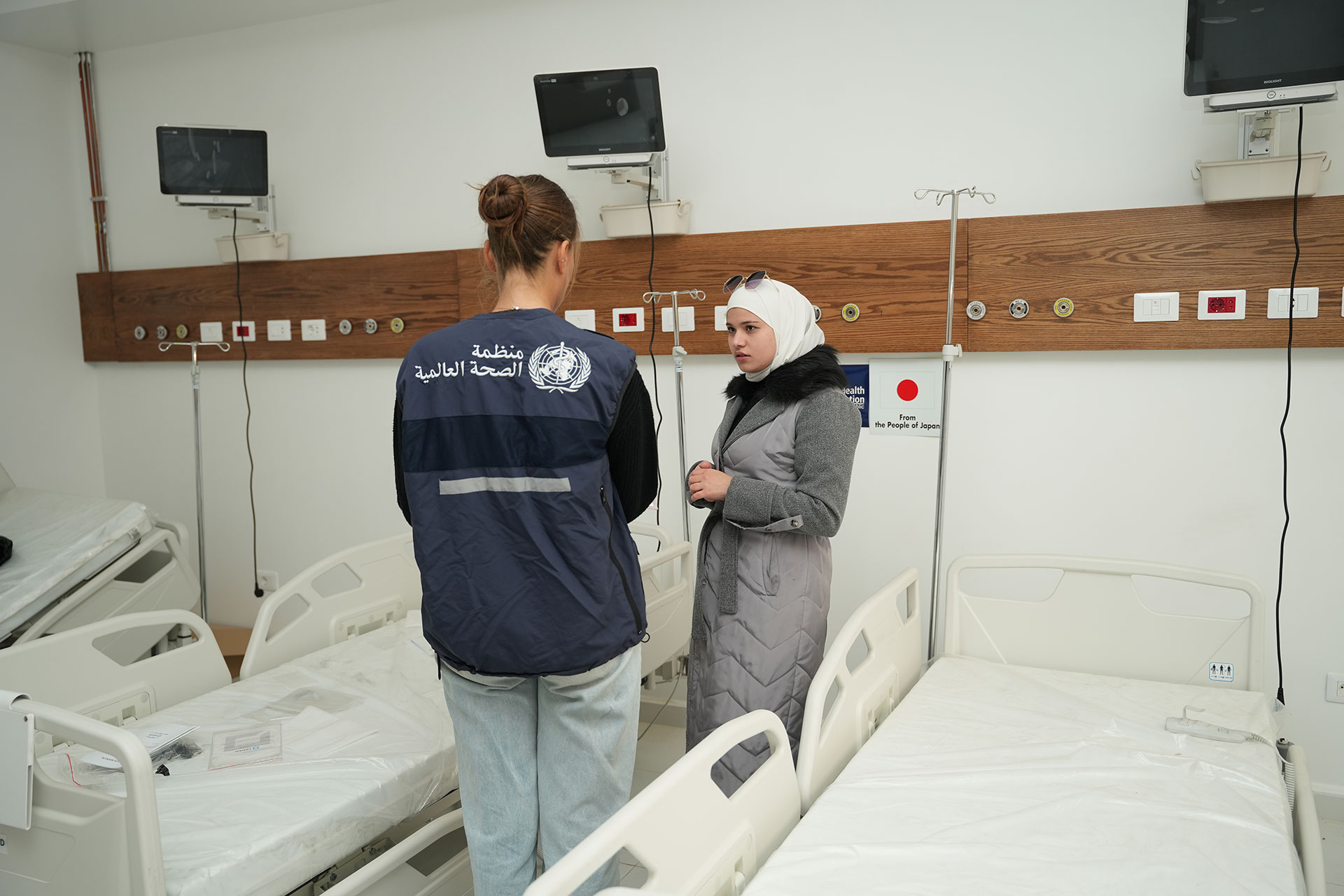 The engineering team inside the newly rehabilitated inpatient ward, equipped and prepared for future patient services. Photo credit: WHO
The engineering team inside the newly rehabilitated inpatient ward, equipped and prepared for future patient services. Photo credit: WHO
For biomedical engineer Rima Ouda, who worked as an engineer on the project, rehabilitation is also about adapting the building to the needs of different groups of patients. “Douma has a large population, and people here have been waiting for a functioning hospital,” she says. “The new design follows international standards, with a strong focus on accessibility and patient comfort – especially for older people, children and people with disabilities.”
“In the final stages of the project, it was clear how closely the engineering teams from the Ministry of Health, the Rural Damascus Health Directorate and WHO were working together,” notes Dr Sidoi. “Regular joint visits, careful supervision and a shared commitment to quality helped ensure that the rehabilitation meets global benchmarks for hospital construction.”
A shared investment in the future of health services
For the Rural Damascus Health Directorate, the restoration of services Douma National Hospital is a critical step in restoring equitable access to care after years of disruption.
“Rehabilitating and equipping Douma National Hospital is an investment in the health of our communities for years to come,” says Dr Taufik Hasaba, Director of the Rural Damascus Health Directorate. “With support from the Government of Japan, under the leadership of the Ministry of Health and in collaboration with WHO, we now have a facility ready to host modern, safe services once staffing, equipment installation and operating budgets are in place. Our shared priority is to ensure that people in Douma and neighbouring areas can receive quality care closer to home.”
WHO technical teams have accompanied the project from design through to completion, ensuring that the hospital layout, infrastructure and equipment planning align with national priorities and international standards.
“Douma National Hospital shows what is possible when long-term partners focus on rebuilding quality, essential services, not only responding to emergencies,” says Dr Wail Ismail, WHO Public Health Officer. “With Japan’s support, this hospital has been structurally rehabilitated and equipped to host high-quality emergency, surgical, maternal, newborn and paediatric care in the future. The next step is to bring in health workers, commission equipment, and fully integrate the hospital into the wider referral network so that this investment translates into tangible services for patients.”
A hospital ready for the day it reopens
For many health workers in Douma, the hospital is more than a building: it is part of the city’s memory. Before it was damaged, surgical patients came from as far as Qarah and al-Dumayr to receive specialized care here.
“We hope that, once services begin, Douma National Hospital will gradually regain its role as a key surgical and emergency hospital for Rural Damascus,” says Dr Sidoi. “If the necessary support continues – to expand some departments, open new units and retain trained staff – the hospital can once again become one of the leading public hospitals in the governorate.”
For now, the wards, operating rooms and intensive care units stand ready, waiting for the day they will be filled with patients, families and health workers again. The rehabilitation of Douma National Hospital is a concrete step towards Syria’s recovery – a sign of how sustained support from partners, including Japan, is helping the countryt rebuild the foundations of its health system.
Building stronger health preparedness across Syria
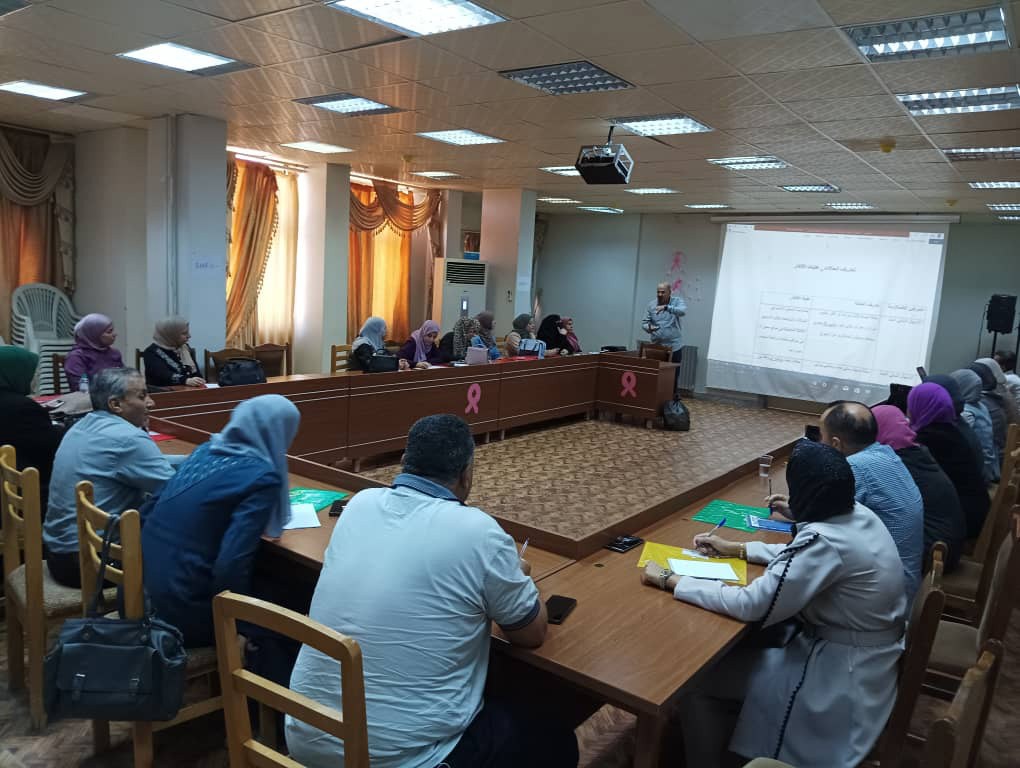 Participants attending the cholera Rapid Diagnostic Tests (RDTs) training in Daraa Governorate. Photo credit: WHO 27 November 2025, Damascus, Syrian Arab Republic – In Syria’s towns and villages, a quick and coordinated response can mean the difference between a contained outbreak and hundreds falling ill. When a child arrives at a clinic with symptoms of acute watery diarrhoea, trained health workers now know what to look for, how to test safely, and how to act fast to protect others.
Participants attending the cholera Rapid Diagnostic Tests (RDTs) training in Daraa Governorate. Photo credit: WHO 27 November 2025, Damascus, Syrian Arab Republic – In Syria’s towns and villages, a quick and coordinated response can mean the difference between a contained outbreak and hundreds falling ill. When a child arrives at a clinic with symptoms of acute watery diarrhoea, trained health workers now know what to look for, how to test safely, and how to act fast to protect others.
To strengthen this readiness across the country, the World Health Organization (WHO) and the Ministry of Health (MoH) have completed a series of nationwide workshops to improve early detection and rapid response to acute watery diarrhoea and other waterborne diseases.
With generous support from the Syria Humanitarian Fund (SHF) — a rapid and flexible pooled funding mechanism managed by the United Nations Office for the Coordination of Humanitarian Affairs (OCHA) to address the most critical humanitarian needs — these joint efforts are helping strengthen Syria’s public health preparedness as communities adapt to challenges such as climate change, population movements, and water scarcity.
“Health workers are the backbone of any health system. By improving their ability to detect and respond quickly to disease outbreaks and keeping them informed with the latest research and tools, we are protecting families and strengthening Syria’s resilience against future health threats,” says Dr Rasmieh Al-Lahham, Technical Officer at WHO Syria.
Across all governorates, 11 three-day workshops brought together health officers responsible for tracking and responding to diseases. Participants learned how to identify suspected cholera cases, investigate outbreaks, report accurately, and coordinate response efforts. More than 300 health workers were trained in updated reporting methods, safe collection and transport of laboratory samples, and essential infection prevention and control practices. The sessions also focused on water, sanitation and hygiene measures and on working closely with rapid response teams to stop outbreaks faster.
In parallel, 11 additional workshops were organized for laboratory technicians working in health centres. These sessions strengthened their skills in using and interpreting rapid diagnostic tests for cholera and reinforced reporting systems that help confirm cases and trigger timely action.
“Every minute counts in outbreak detection and response,” adds Dr Rasmieh Al-Lahham. “With support from the Syria Humanitarian Fund, we were able to cover the operational costs for Ministry of Health rapid response teams to verify suspected cases, follow up in the field, improve data accuracy, and ensure health facilities are ready to respond. We also helped strengthen communication skills so health workers can raise awareness in their communities on how to prevent illness and protect their families.”
From the first signs of illness in a local clinic to the coordinated action of trained health workers, these efforts now mean faster detection, quicker confirmation, and stronger protection for families across Syria – helping keep communities safe and healthy.
How two hospitals provide continuous care for dialysis patients and newborns
26 November 2025, Aleppo, Syrian Arab Republic – For many families across northern Aleppo, weekly visits to their local hospital are a vital lifeline — whether for lifesaving dialysis sessions or for the care of newborns recovering from early illness. At Azaz National Hospital and Marea National Hospital, health workers provide steady, reliable services that help patients manage long-term conditions and protect infants during their most vulnerable days.
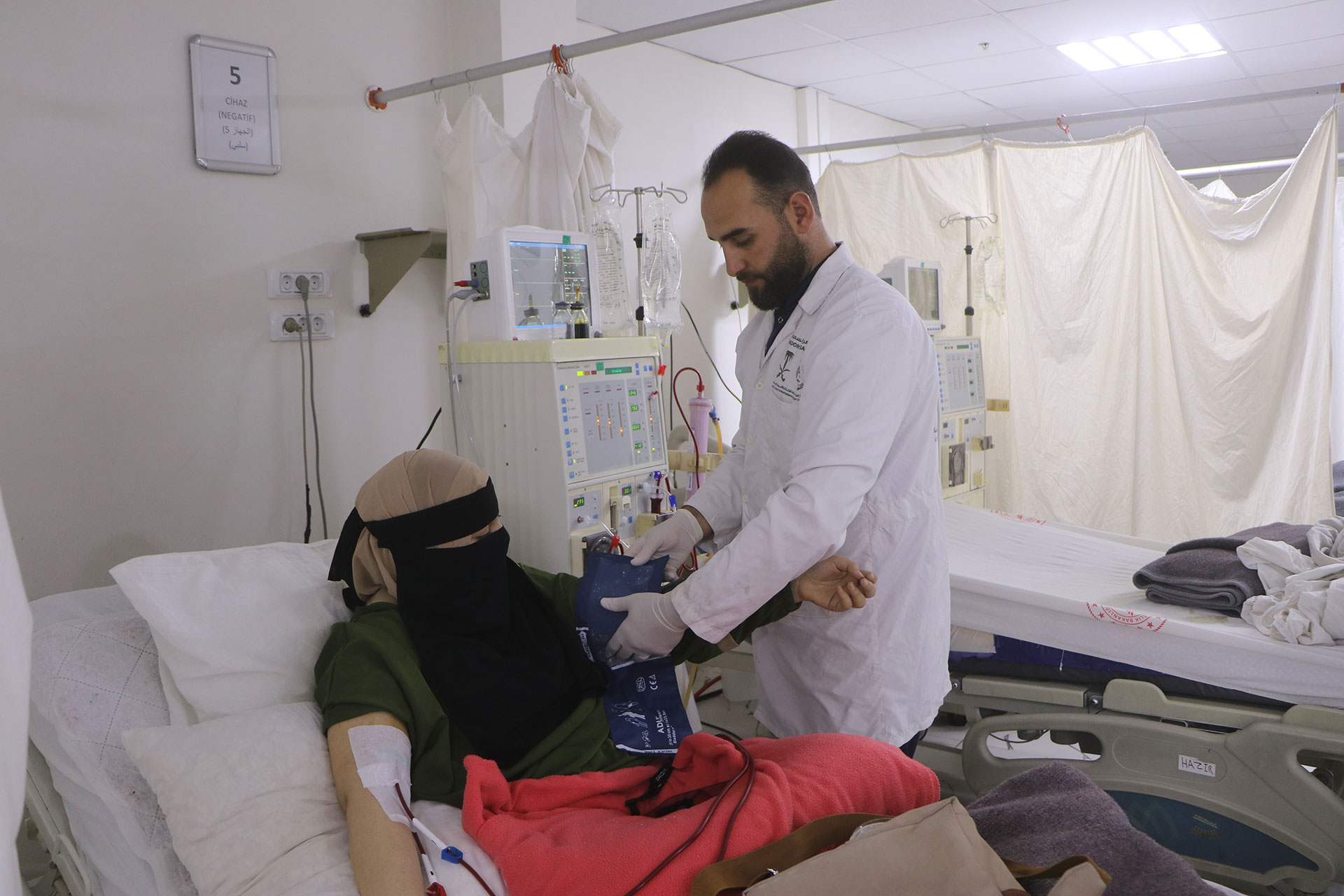 Abd al-Rouf Saqqar supports patient Sireen Assi during a dialysis session at Azaz National Hospital. Photo credit: WHO
Abd al-Rouf Saqqar supports patient Sireen Assi during a dialysis session at Azaz National Hospital. Photo credit: WHO
At Azaz National Hospital, Sireen Assi arrives twice a week for dialysis. Living with kidney failure has meant years of regular treatment, but the routine brings stability and keeps her symptoms under control. Nurse Abd al-Rouf Saqqar, who oversees her sessions, says familiarity and consistency matter.
“Dialysis is not easy for any patient,” he explains. “Regular attendance helps us stabilise their condition and prevent complications. We try to make every session as comfortable as possible.”
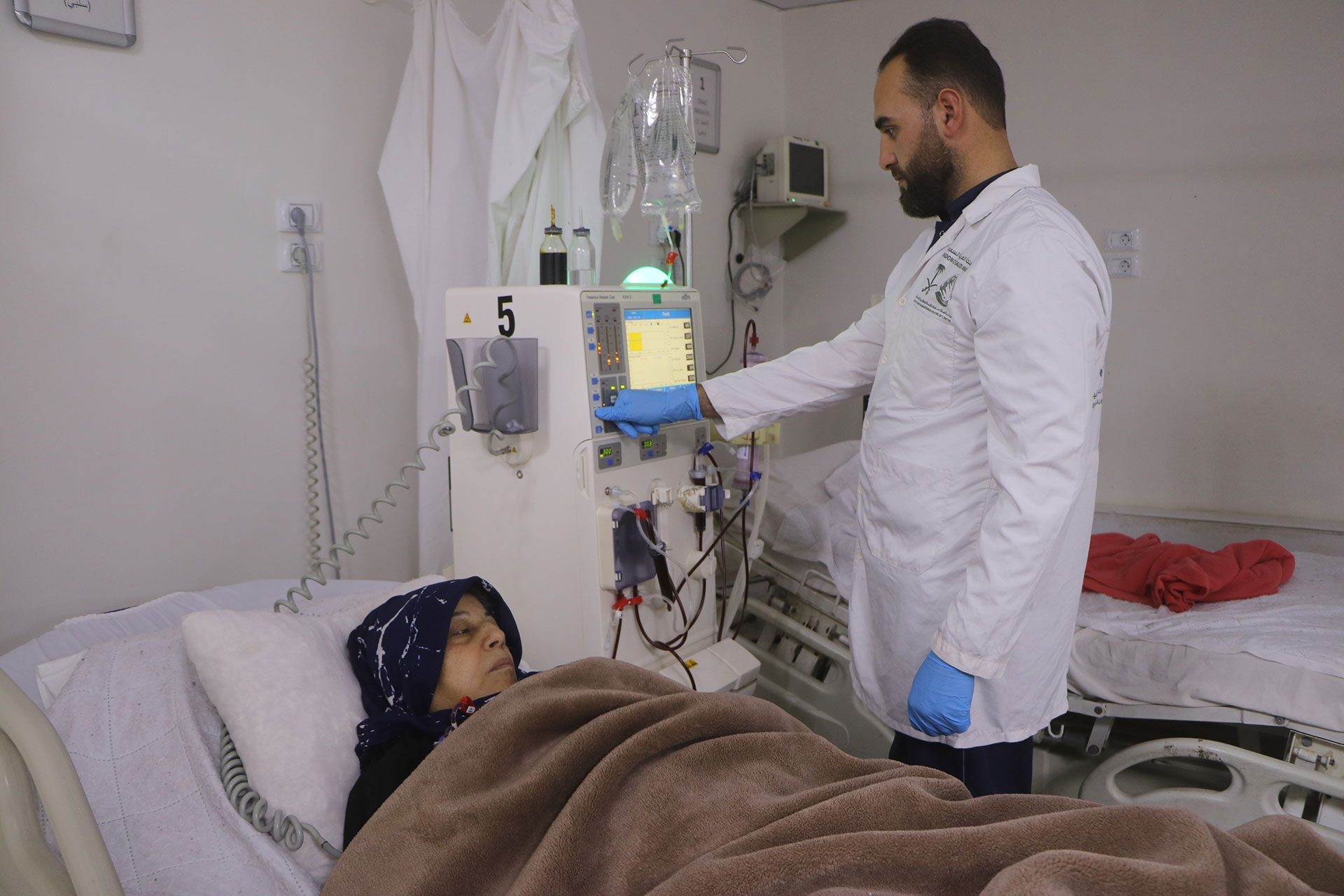 Sabah Al-Ahmad receives dialysis care from nurse Abd al-Rouf Saqqar at Azaz National Hospital. Photo credit: WHO
Sabah Al-Ahmad receives dialysis care from nurse Abd al-Rouf Saqqar at Azaz National Hospital. Photo credit: WHO
In the same unit, Sabah Al-Ahmad receives her twice-weekly treatment under the guidance of the same team. For her, the predictability of care makes a significant difference.
“Many of our patients have been coming for years,” says Abd al-Rouf. “We know their routines, their concerns, and how their bodies respond to treatment. That trust makes the care smoother and safer.”
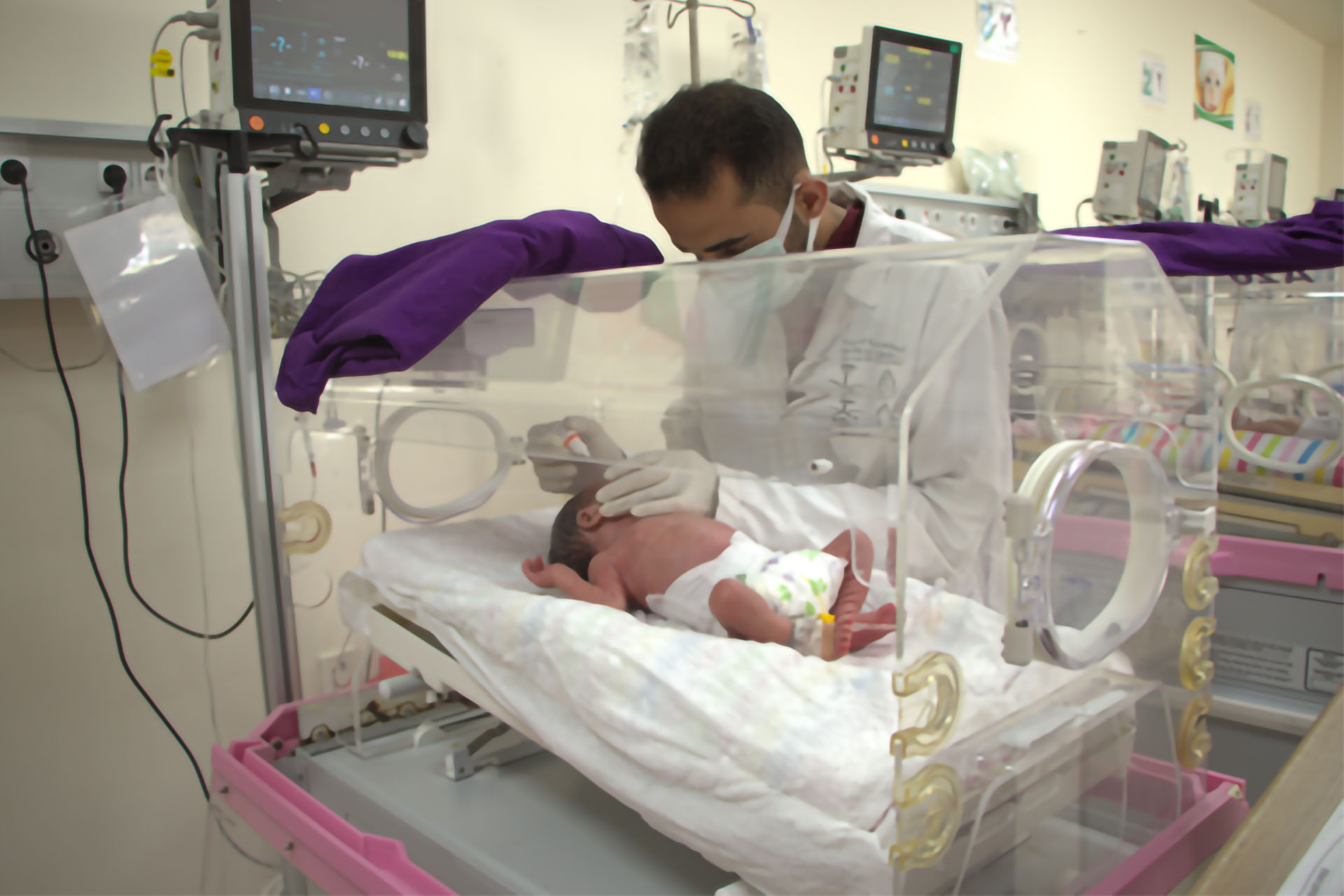 Ahmad Al-Taweel examines infant Mohammad Abbas inside the neonatal unit at Marea National Hospital. Photo credit: WHO
Ahmad Al-Taweel examines infant Mohammad Abbas inside the neonatal unit at Marea National Hospital. Photo credit: WHO
Further south, at Marea National Hospital, Mohammad Abbas was admitted to the neonatal unit with a skin condition requiring close observation and specialized care. Nurse Ahmad Al-Taweel and the incubator unit team monitored him closely, adjusted treatment as needed, and supported his family throughout his stay.
“Skin conditions in newborns need close observation,” says Ahmad. “We monitor the child hour by hour and keep the parents informed. When a baby improves, everyone in the unit feels it.”
Whether in dialysis wards or neonatal units, hospitals in Azaz and Marea provide continuous care that families depend on – week after week, month after month.
Services at both hospitals are delivered in coordination with the Ministry of Health and implemented on the ground through health partners, ensuring that families in northern Aleppo can access essential care close to home.
Since late 2024, support from the King Salman Humanitarian Aid and Relief Centre (KSrelief) has helped WHO keep 50 health facilities running across Aleppo and Idlib, enabling uninterrupted access to services such as dialysis, neonatal care and other essential health interventions.
Three childhood symptoms, three clinics, one goal: keeping children safe
25 November 2025, Aleppo, Syrian Arab Republic – Across northern Aleppo, parents often act quickly when their children show signs of illness – whether it begins with ear pain, a sudden fever, a persistent cough or stomach upset. At three different primary health centres, doctors say these early visits are what help them to protect children from conditions that can worsen quickly.
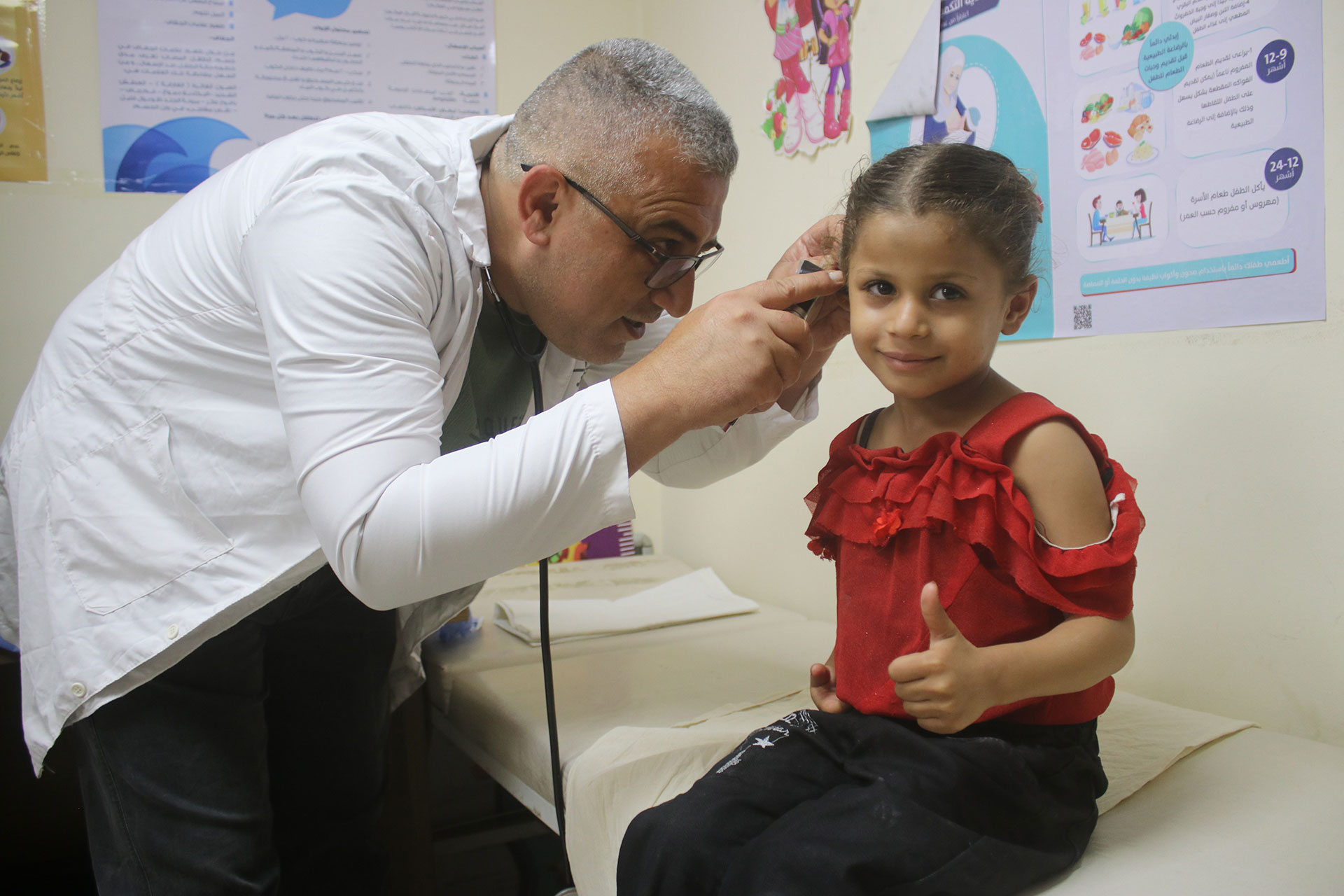 Dr. Shadwan Mohammed Hindawi examines Nour Ibrahim Al-Hassan during a consultation at the paediatric clinic in Azaz Health Centre. Photo credit: WHO
Dr. Shadwan Mohammed Hindawi examines Nour Ibrahim Al-Hassan during a consultation at the paediatric clinic in Azaz Health Centre. Photo credit: WHO
At Azaz Health Centre, paediatrician Dr. Shadwan Mohammed Hindawi welcomed Nour Ibrahim Al-Hassan, who arrived with ear pain and a high fever. After examining her, he prescribed treatment to ease the infection and guided her mother on how to manage symptoms at home.
“Ear infections start suddenly and they worry parents,” says Dr. Shadwan. “Once we examine the child and explain the treatment, you can see the relief. Early visits help us act before the infection spreads or the fever rises further.”
At Qareh Koubré Health Centre, Mohammad Bilal Al-Qasem was brought in by his father after several days of coughing and chest irritation. Dr. Mustafa Hamdan Kareem assessed his breathing and diagnosed a bronchial infection.
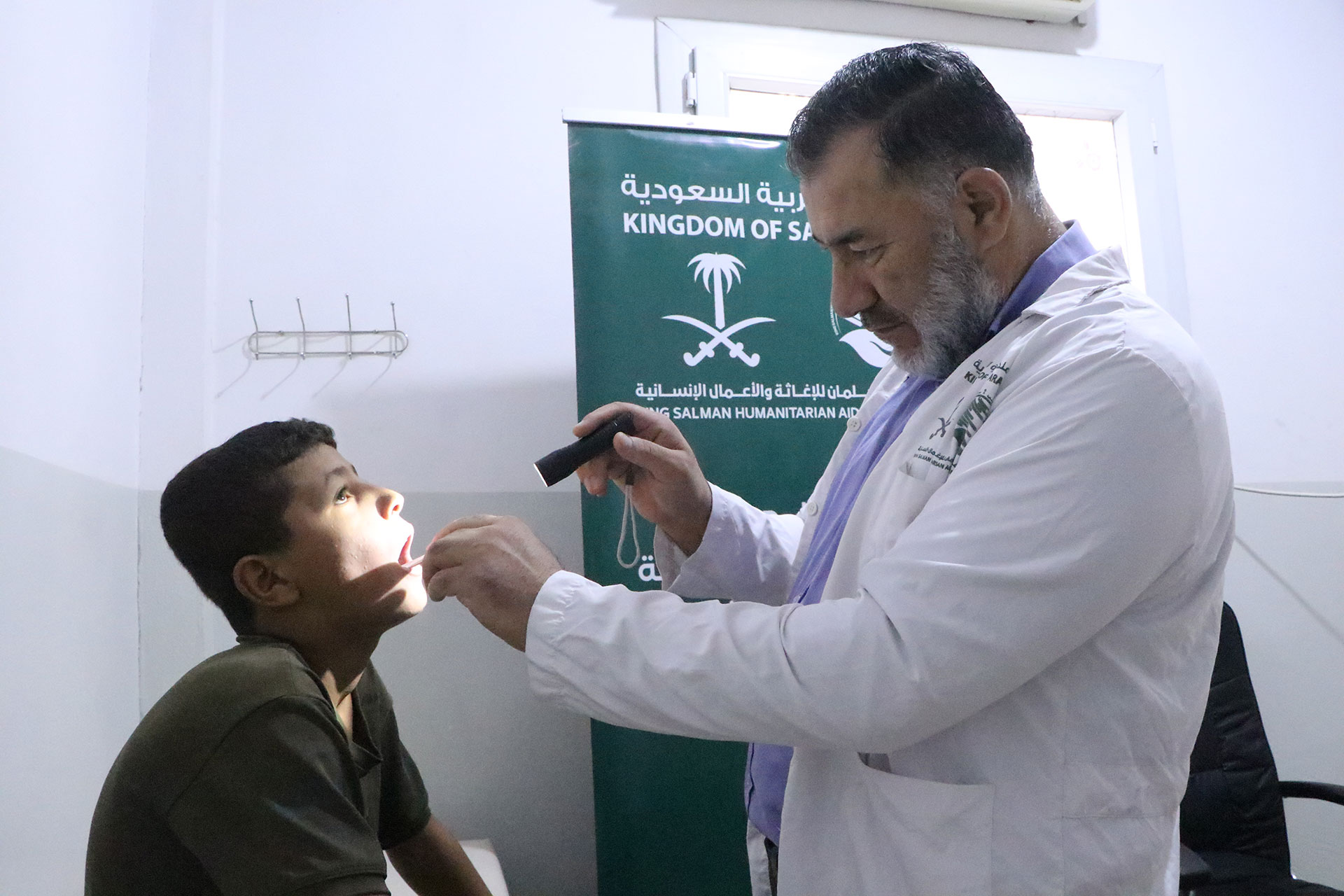 Dr. Mustafa Hamdan Kareem examines Mohammad Bilal Al-Qasem during a consultation at Qareh Koubré Health Centre in Aleppo. Photo credit: WHO
Dr. Mustafa Hamdan Kareem examines Mohammad Bilal Al-Qasem during a consultation at Qareh Koubré Health Centre in Aleppo. Photo credit: WHO
“We see many children with chest symptoms, especially during seasonal changes,” Dr. Mustafa explains. “Parents often wait to see if it will pass, but checking early helps us treat the inflammation before it becomes more serious. Our aim is always to help a child breathe comfortably again.”
Further east, at Tal Al-Hawa Health Centre, Ei Nour Hussein arrived with vomiting and diarrhoea – symptoms that can lead to dehydration, especially in young children. Dr. Youssef Aboush examined her, checked her hydration status, and provided medication and guidance to her father.
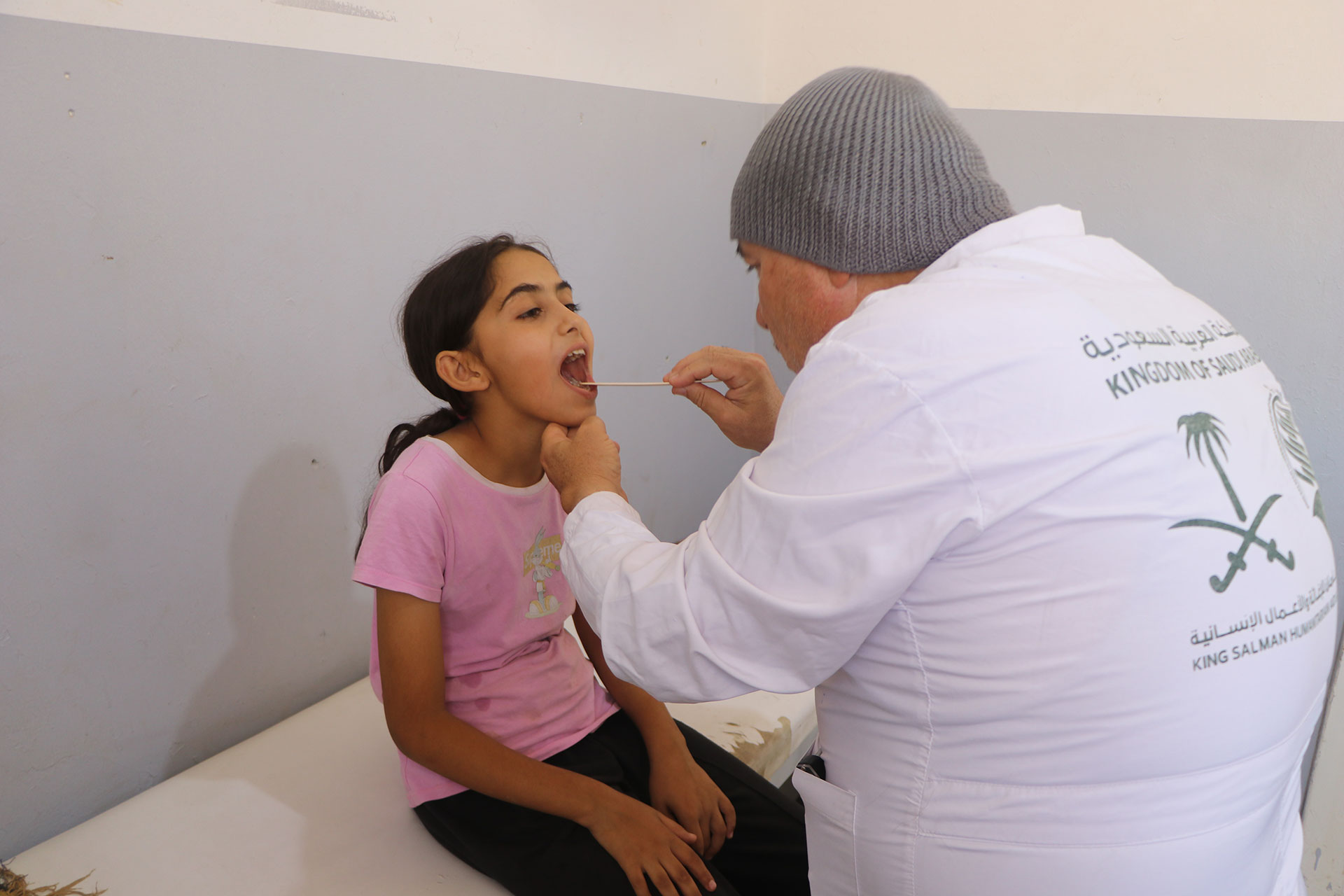 Ei Nour Hussein is examined by Dr. Youssef Aboush at Tal Al-Hawa Health Centre. Photo credit: WHO
Ei Nour Hussein is examined by Dr. Youssef Aboush at Tal Al-Hawa Health Centre. Photo credit: WHO
Further east, at Tal Al-Hawa Health Centre, Ei Nour Hussein arrived with vomiting and diarrhoea – symptoms that can lead to dehydration, especially in young children. Dr. Youssef Aboush examined her, checked her hydration status, and provided medication and guidance to her father.
“Dehydration can develop fast in children,” says Dr. Youssef. “When a child comes in with vomiting and diarrhoea, our priority is to stabilise them and reassure the family. Simple treatment at the right time can prevent a hospital visit.”
Across Azaz, Qareh Koubré and Tal Al-Hawa, health workers share a common goal: catching illnesses early so children can recover safely at home.
Services at these health centres are delivered in coordination with the Ministry of Health and implemented on the ground through local partners, whose teams make sure that essential care remains available for families with limited options.
Since late 2024, support from the King Salman Humanitarian Aid and Relief Centre (KSrelief) has helped WHO keep 50 health facilities running across Aleppo and Idlib, ensuring that families can access the care they need close to home.
How Dr. Hossam helps families get care when they need it most
24 November 2025, Aleppo, Syrian Arab Republic – At Al-Bab Health Centre in eastern Aleppo, the general outpatient clinic is often the first stop for people seeking answers about sudden symptoms or lingering illness. Every day, Dr. Hossam Sadiq Al-Othman examines dozens of patients, many arriving with breathing difficulties, chest discomfort, or seasonal infections.
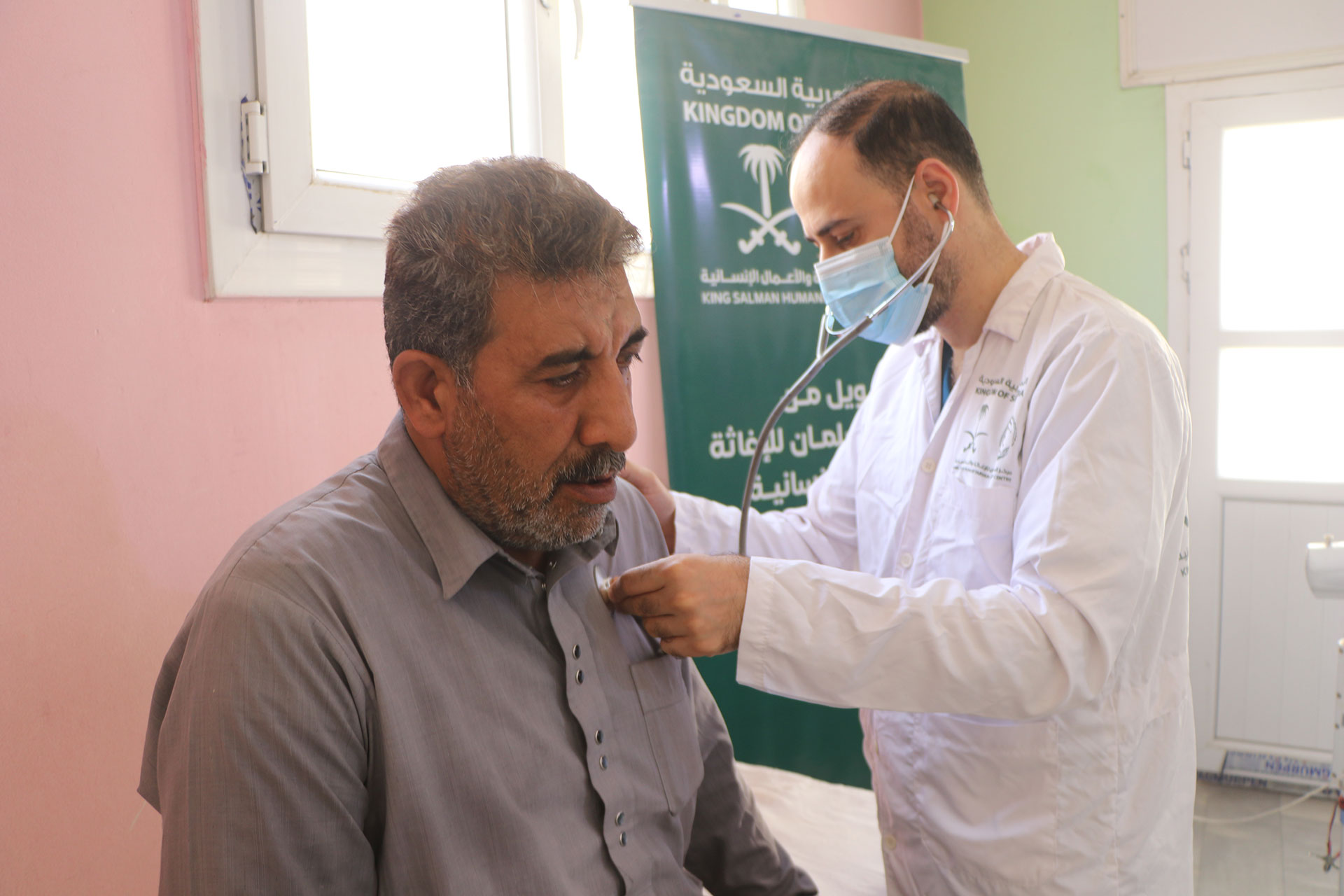 Dr. Hossam Sadiq Al-Othman examines Ali Ahmad Al-Shounah as part of his clinical assessment at Al-Bab Health Centre. Photo credit: WHO
Dr. Hossam Sadiq Al-Othman examines Ali Ahmad Al-Shounah as part of his clinical assessment at Al-Bab Health Centre. Photo credit: WHOAmong them was Ali Ahmad Al-Shounah, who arrived with a persistent cough, chest tightness and difficulty breathing. After a full examination, Dr. Hossam prescribed medication to ease his breathing and reduce inflammation.
“When someone comes in struggling to breathe, you have to act fast,” says Dr. Hossam. “Most patients try to manage on their own for days. Just being heard and treated quickly makes a big difference for them.”
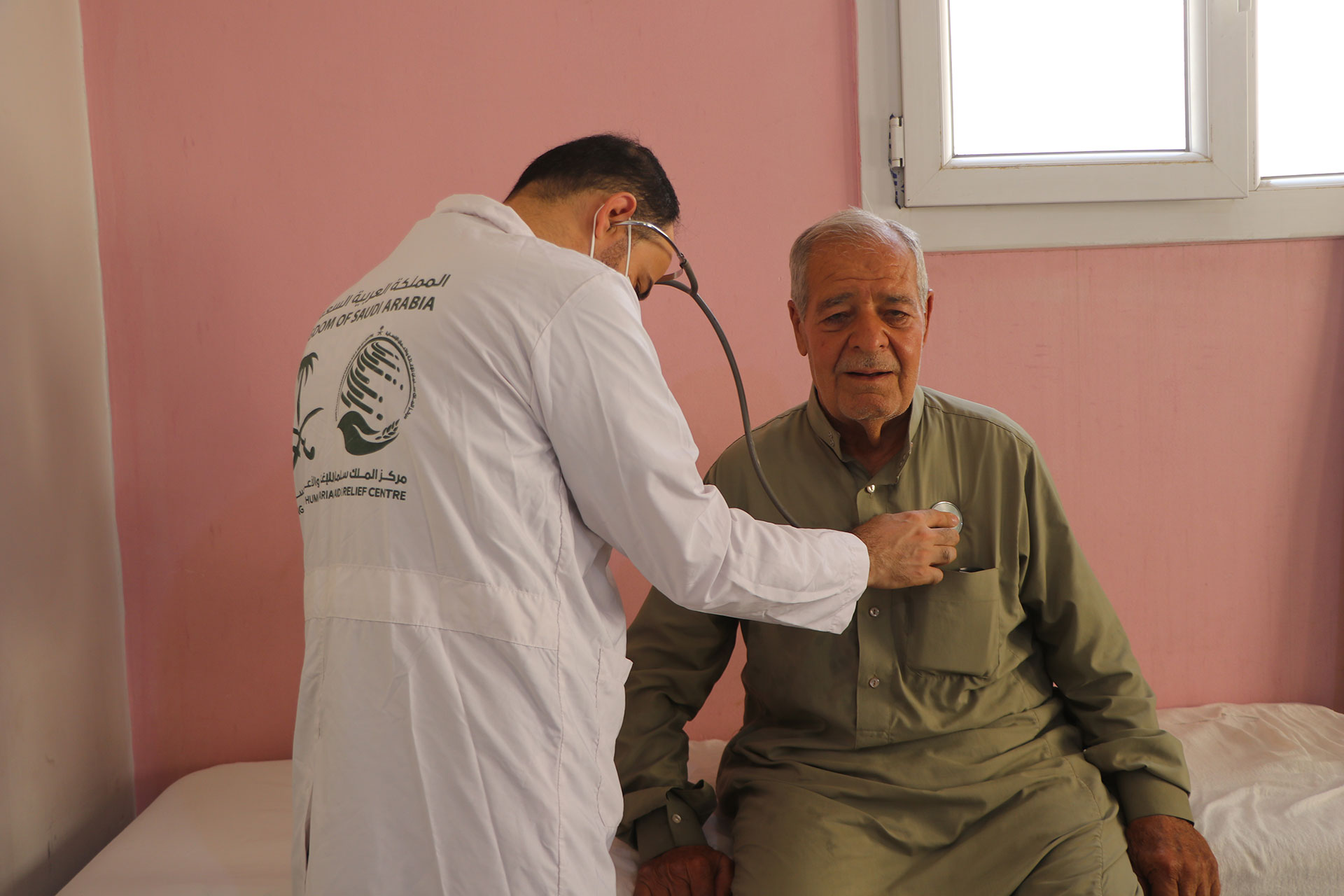 Dr. Hossam examines Mohammad Mahmoud Hamsho during a consultation at the centre. Photo credit: WHO
Dr. Hossam examines Mohammad Mahmoud Hamsho during a consultation at the centre. Photo credit: WHOLater that same day, Mohammad Mahmoud Hamsho visited the clinic with severe chest irritation and signs of infection. Dr. Hossam assessed his symptoms and provided treatment to prevent the condition from getting worse.
“People here work hard and push through their symptoms,” he explains. “When they finally come to the clinic, they’re often tired and worried. Our job is to reassure them, explain what’s happening, and help them get back on their feet.”
For many families in Al-Bab, the outpatient clinic is a lifeline that keeps common illnesses from turning into emergencies. Dr. Hossam says the goal is simple: “We want people to know they can rely on us. Even small interventions, when done on time, can protect someone’s health.”
Services at Al-Bab Health Centre are delivered in coordination with the Ministry of Health and implemented on the ground through Alameen Organization, whose teams ensure that essential care remains available to communities with limited options.
Since late 2024, support from the King Salman Humanitarian Aid and Relief Centre (KSrelief) has helped WHO keep 50 health facilities running across Aleppo and Idlib, ensuring people can access the care they need close to home.
Health workers in Syria raise awareness on the risks of antibiotic misuse
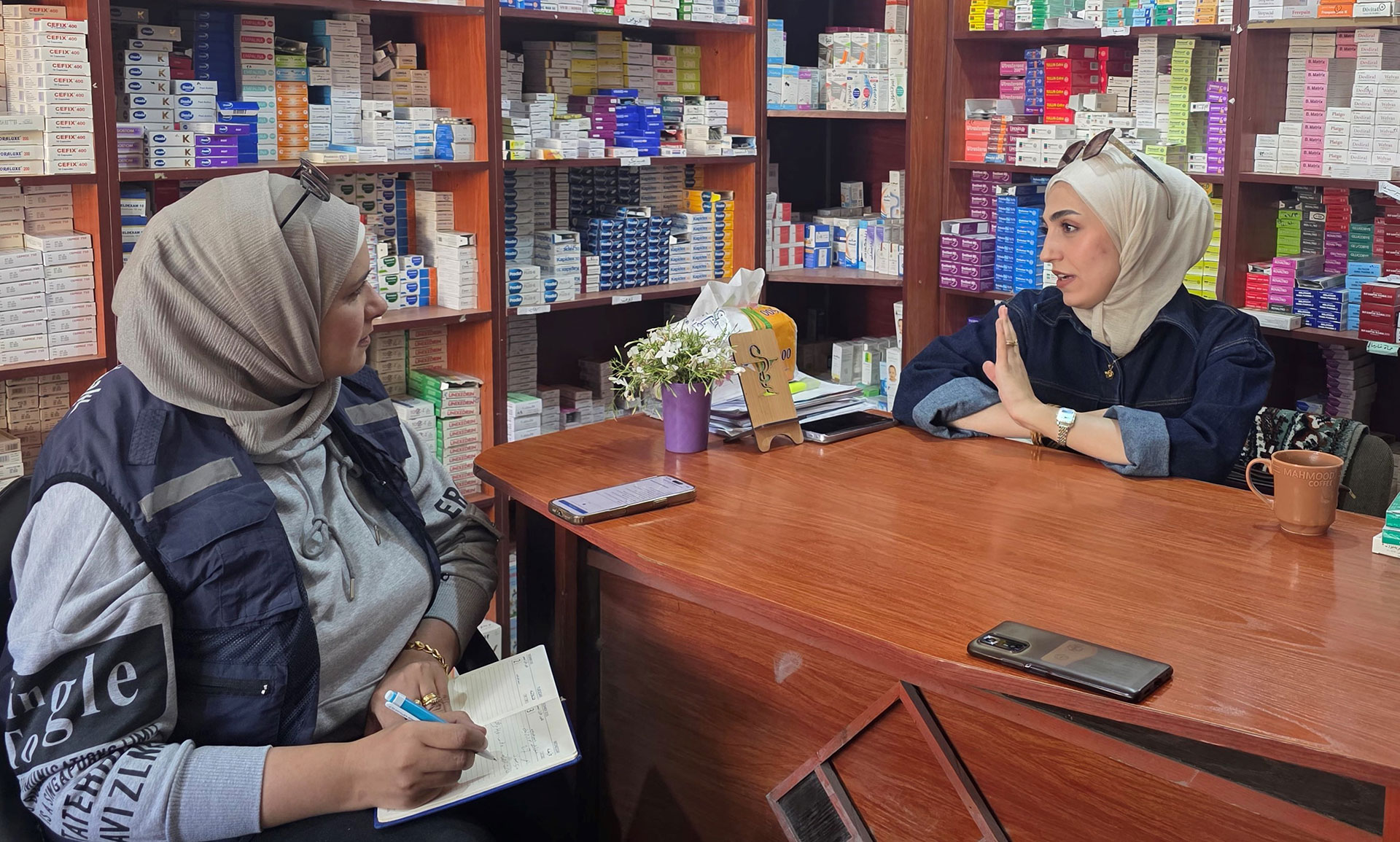 Malak Fouad, a pharmacist in Deir-ez-Zor, discusses local patterns of antibiotic use during a WHO visit. Photo credit: WHO 24 November 2025, Damascus, Syrian Arab Republic – Across Syria, health workers are raising their voices against the growing threat of antimicrobial resistance (AMR). In hospitals, clinics, and community pharmacies, they continue to guide families on the safe use of antibiotics — even as difficult living conditions make responsible use harder to maintain. Their experiences reveal a mix of challenges and determination, and a shared commitment to protect patients from infections that are becoming increasingly difficult to treat.
Malak Fouad, a pharmacist in Deir-ez-Zor, discusses local patterns of antibiotic use during a WHO visit. Photo credit: WHO 24 November 2025, Damascus, Syrian Arab Republic – Across Syria, health workers are raising their voices against the growing threat of antimicrobial resistance (AMR). In hospitals, clinics, and community pharmacies, they continue to guide families on the safe use of antibiotics — even as difficult living conditions make responsible use harder to maintain. Their experiences reveal a mix of challenges and determination, and a shared commitment to protect patients from infections that are becoming increasingly difficult to treat.
“Many families still believe antibiotics are the solution for any fever or seasonal cold. Convincing patients about the long-term effects of taking unprescribed medication is becoming increasingly challenging,” says Dr Malak Fouad Kharaba, a laboratory specialist at the National Hospital in Deir-ez-Zor.
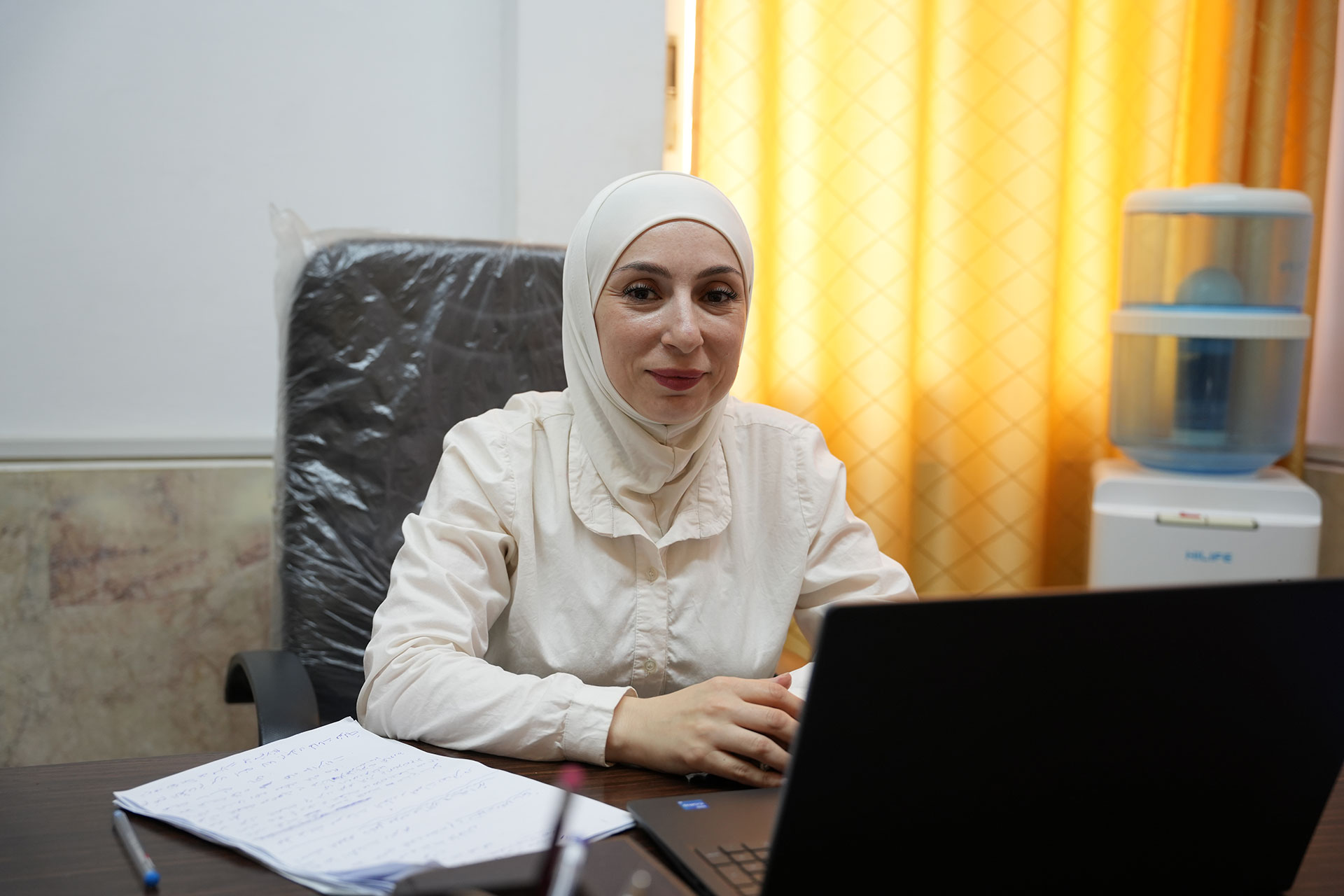 Afraa Mawardi, Head of the Drug Control Unit at the National Hospital in Lattakia, at her office, talks about the issue of antibiotic use. Photo credit: WHOShe notes that patient trust, accessible services, and community outreach remain essential to helping people understand when antibiotics are needed — and when they are not.
Afraa Mawardi, Head of the Drug Control Unit at the National Hospital in Lattakia, at her office, talks about the issue of antibiotic use. Photo credit: WHOShe notes that patient trust, accessible services, and community outreach remain essential to helping people understand when antibiotics are needed — and when they are not.
“With better living conditions, trust, and more awareness of the risks, we can protect patients and save more lives. Awareness campaigns can make a difference, but more effort is needed so that people can protect themselves and those they love,” she adds.
“The issue of antibiotic use is an old and continuing one. Most people understand the risks, but many are forced to seek antibiotics without consulting a doctor because they cannot afford a visit,” explains Afraa Mawardi, pharmacist and Head of the Drug Control Unit at the National Hospital in Lattakia. “We face two main problems — the random use of antibiotics and not completing the prescribed treatment.”
Dr Zein Ali Douba, an oncology specialist in Aleppo, discusses the consequences of antibiotic misuse for patients with weakened immunity. Photo credit: WHO Afraa stresses that ensuring steady availability of medicines and strengthening health centres can help curb misuse. “With continued support to health facilities and ongoing awareness, we can help people get the right treatment at the right time.”
Health workers also note that antibiotic resistance is driven by several interconnected factors beyond individual use. Antibiotics are widely used in livestock and agriculture, and residues can enter the environment through wastewater and soil. Many health facilities face challenges with infection prevention and control, which increases the need for antibiotics and raises the risk of resistant infections. Strengthening these systems through a OneHealth approach — from clean water and waste management to better regulation of agricultural use — is essential to slow the spread of resistance.
In Aleppo, the consequences of antibiotic misuse are especially severe for patients with weakened immunity.
“For oncology and hematology patients, even a minor infection can become dangerous if antibiotics no longer work,” says Dr Zein Ali Douba. “This is why avoiding unnecessary antibiotics — and consulting a doctor before taking any medication — is so important.”
She explains that limited prescription controls and the pressure on health facilities often leave vulnerable patients exposed to inappropriate treatments. “With stronger regulation of antibiotic sales and continued support to health centres, we can help protect patients who face the highest risks of resistant infections.”
For pharmacists like Kamal Al-Dallal in Hama, daily interactions with patients reveal both persistent misconceptions and gradual progress.
“Over the past 15 years, I have seen hundreds of patients who believe antibiotics can cure any infection and that stopping treatment early causes no harm,” he says.
At his pharmacy, many still request antibiotics without a prescription — even for conditions that do not require them. Yet Kamal notes that awareness is slowly improving. “With ongoing awareness efforts and proper training for health workers, we can ensure antibiotics remain effective for everyone who needs them.”
In Homs, frontline clinicians increasingly encounter respiratory infections that do not respond to standard treatments.
“Many patients have respiratory infections resistant to several antibiotics. This makes treatment difficult, lengthy, and sometimes ineffective,” explains Dr Malek Al-Aweer from Homs University Hospital. “Random use of antibiotics — without prescriptions or medical guidance — is a major cause.”
He adds that stronger regulation, more learning in schools and communities, and continuous training for health workers are key steps to reducing misuse. “With collective efforts and support for the health system, we can help people get the right treatment at the right time.”
As Syria joins the World AMR Awareness Week, these voices from across the country highlight a shared concern — and a shared goal: protecting patients, strengthening health systems, and preserving the effectiveness of antibiotics for future generations.
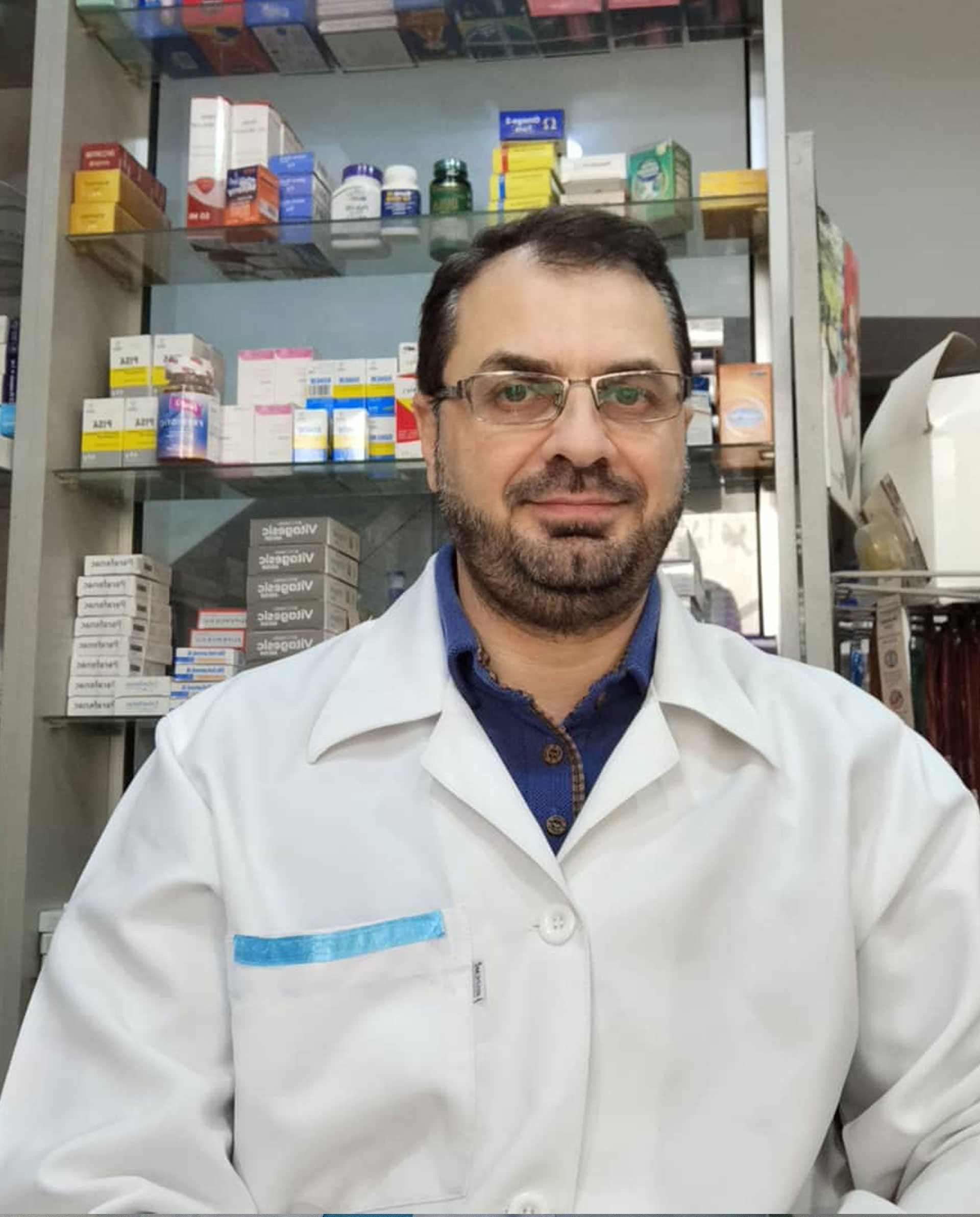 Dr Kamal Al-Dallal at his pharmacy in Hama tells of his experience with people who request antibiotics without prescriptions . Photo credit: WHO
Dr Kamal Al-Dallal at his pharmacy in Hama tells of his experience with people who request antibiotics without prescriptions . Photo credit: WHO
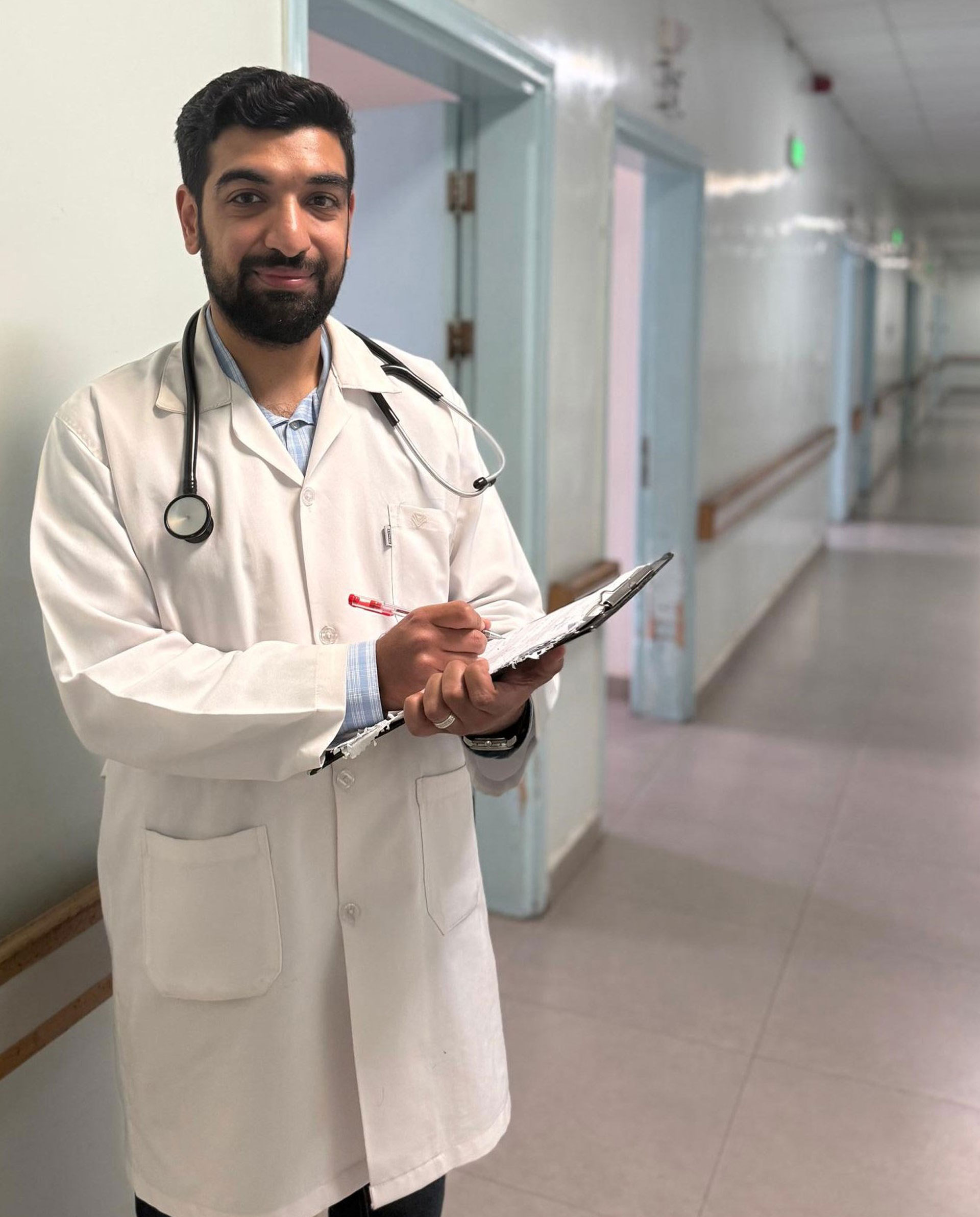 In Homs, Dr Malek Al-Aweer reviews a patient chart while standing in the hospital corridor. Photo credit: WHO
In Homs, Dr Malek Al-Aweer reviews a patient chart while standing in the hospital corridor. Photo credit: WHO
Health as a bridge from emergency to recovery at the Syria Senior Officials Meeting in Oslo
23 November 2025, Oslo, Norway – At the Ninth Humanitarian Senior Officials Meeting (SOM) on Syria, WHO highlighted how essential health services can help guide the country’s transition from crisis response to early recovery. Co-hosted by the European Union and Norway, the meeting brought together senior officials from the Syrian authorities, donor governments, UN agencies and humanitarian partners.
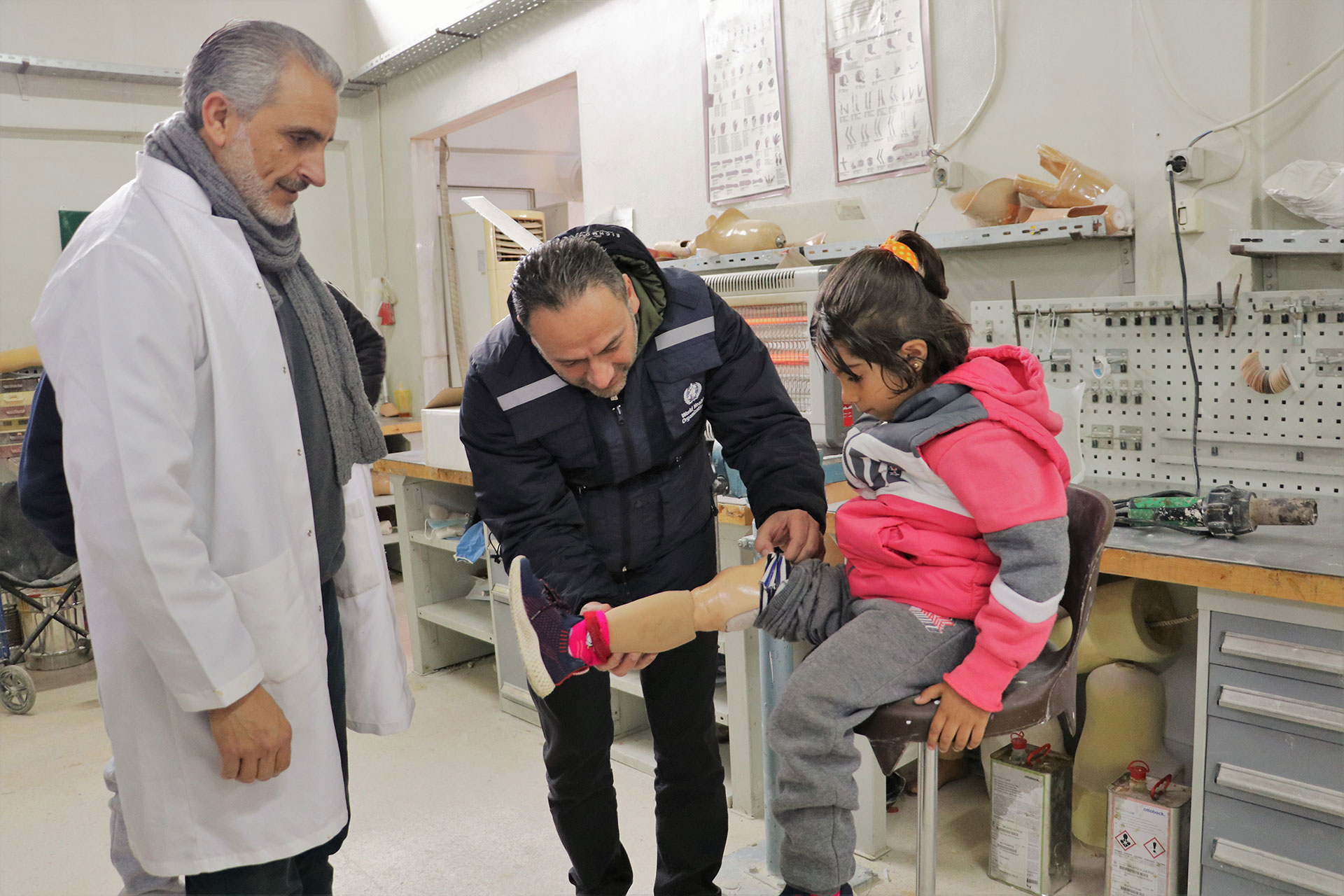 WHO’s Public Health Officer Dr Wail Ismail visits a rehabilitation centre where a prosthetics technician supports a young girl during a follow-up check of her artificial limb. Photo credit: WHO
WHO’s Public Health Officer Dr Wail Ismail visits a rehabilitation centre where a prosthetics technician supports a young girl during a follow-up check of her artificial limb. Photo credit: WHO
Christina Bethke, WHO Acting Representative to Syria, addressed the session on Syria’s transition toward early recovery. She drew on the Ministry of Health’s two-year strategic roadmap to show how targeted investments can stabilize services and strengthen national systems. The plan focuses on restoring priority facilities, reinforcing the workforce, and improving health financing and information systems.
Primary health centres, referral hospitals and outreach services remain the backbone of care across the country. Reflecting this, Bethke noted that “the facilities keeping people alive today are the same ones that will anchor dignified returns and local recovery tomorrow. If they close now, there is no credible pathway from emergency response to recovery.”
The meeting also underscored the urgent need to support Syria’s health workforce, which has been severely strained by years of conflict and economic hardship. “Infrastructure matters, but without people there is no health system,” Bethke said. “Treating health workers as a long-term national asset is one of the fastest and most practical bridges from relief to recovery.”
WHO and partners are backing labour market assessments, gap-filling in priority facilities, incentives for staff in under-served areas, and new opportunities for training, supervision and twinning with regional entities, while also working to strengthen Syria’s institutional capacity.
Ms. Bethke also highlighted how local health facilities can help communities take their first steps toward recovery. “In many places, the local health centre is one of the first public institutions that people see functioning after conflict,” she said. “When a clinic is safely rehabilitated, has clean water and reliable power, and offers mental health support, antenatal care, safe childbirth and newborn services, it signals that essential services are returning. These improvements help restore trust and support families as they begin rebuilding their lives.”
Across the meeting, partners agreed on the need to protect humanitarian health funding while allowing greater flexibility for early recovery. “Flexible, predictable financing aligned with the Ministry of Health’s two-year plan will allow Syrians to see one coherent offer, rather than competing agendas,” Bethke added.
WHO reaffirmed its commitment to supporting national leadership and strengthening coordination across humanitarian, development, and financial partners. With sustained collaboration, health can help safeguard lives today while laying foundations for stability, dignity, and recovery.
How community health workers help families in Al-Bab monitor their children’s growth
23 November 2025, Aleppo, Syrian Arab Republic – At Al-Bab Health Centre in eastern Aleppo, routine growth monitoring offers families reassurance that their children are developing well. For Mona Talrafadi, who visited the centre with her mother, the checkup confirmed she was healthy and thriving.
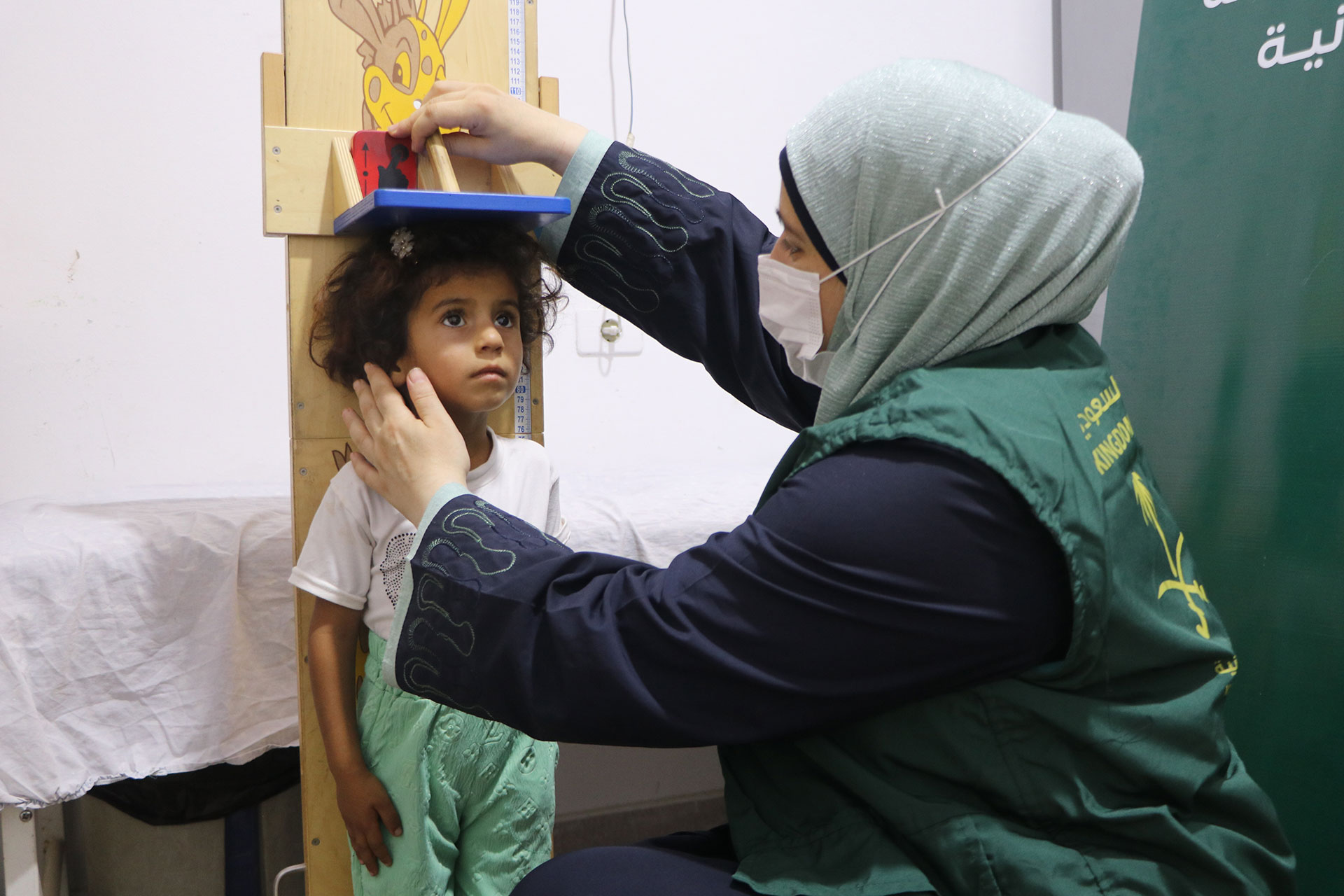 Community health worker Dumoo’ checks Mona Talrafadi’s height as part of regular growth monitoring at Al-Bab Health Centre in eastern Aleppo. Photo credit: WHO
Community health worker Dumoo’ checks Mona Talrafadi’s height as part of regular growth monitoring at Al-Bab Health Centre in eastern Aleppo. Photo credit: WHO
Inside the community health section, community health worker Dumoo’ welcomed Mona and her mother with a gentle smile. She measured Mona’s height, weight and mid-upper arm circumference — simple but essential assessments that help detect early signs of malnutrition. All of Mona’s measurements were within normal ranges.
“We focus on catching any issues early,” says Dumoo’. “A few minutes of checking can prevent months of worry for a family. These visits help us understand how children are growing and whether they need extra support.”
After documenting the results, Dumoo’ sat with Mona’s mother to discuss healthy feeding practices, hydration, and the importance of regular follow-up appointments. “A lot of mothers tell us they feel overwhelmed,” she explains. “So we always try to give advice that is simple, practical, and fits their daily lives.”
For Dumoo’, the connection with parents matters as much as the measurements. “When a mother leaves here feeling more confident, that is success for us,” she says. “They trust us, and we want them to know we are always here to listen.”
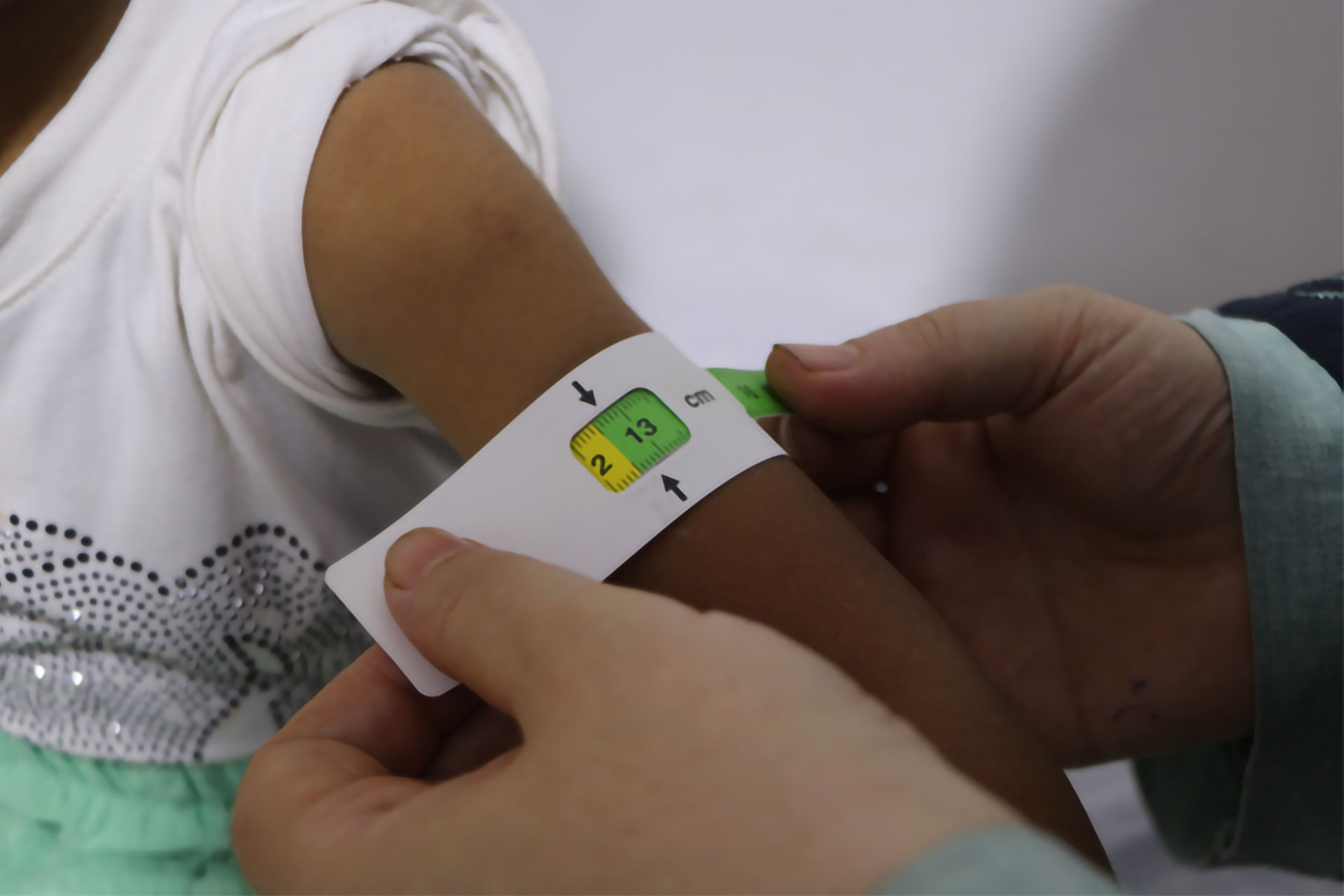 A close view of a mid-upper arm circumference measurement taken during Mona’s health assessment. Photo credit: WHO
A close view of a mid-upper arm circumference measurement taken during Mona’s health assessment. Photo credit: WHO
Mona’s mother agreed. “They explained everything clearly,” she says. “These visits help me feel confident about how to care for her.”
The services at Al-Bab Health Centre are delivered in coordination with the Ministry of Health and implemented on the ground through Alameen Organization, whose teams ensure essential health care remains available to communities with limited options.
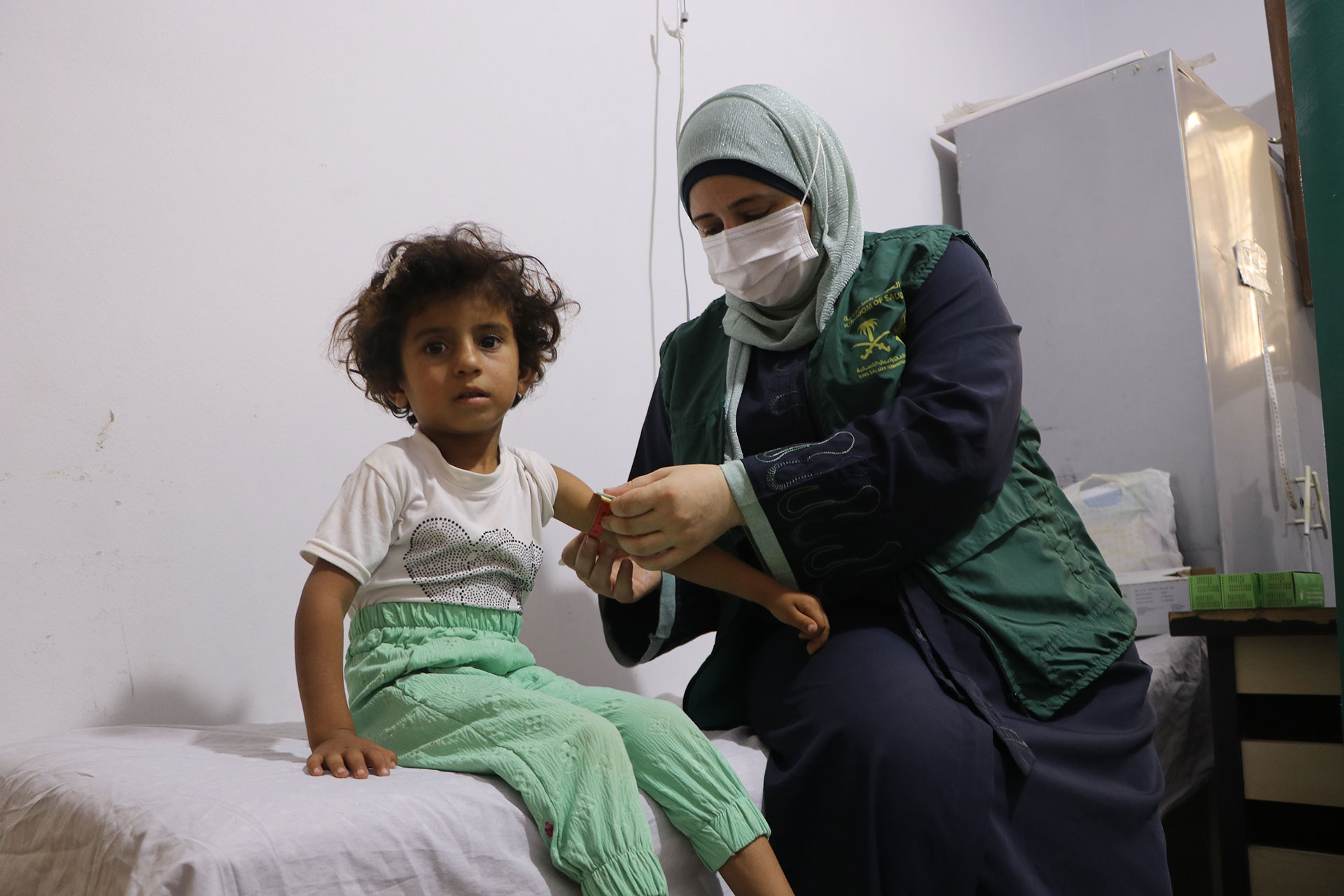 Dumoo’ measures Mona Talrafadi’s mid-upper arm circumference during a routine growth-monitoring. Photo credit: WHO
Dumoo’ measures Mona Talrafadi’s mid-upper arm circumference during a routine growth-monitoring. Photo credit: WHO
Since late 2024, continued support from the King Salman Humanitarian Aid and Relief Centre (KSrelief) has helped WHO keep 50 health facilities operational across northwest Syria, including Al-Bab. This contribution has ensured uninterrupted access to primary, secondary, and specialized services – from essential medicines and supplies to dialysis care, which remains a growing need in the region.
How Maryam’s laboratory work keeps families in Al-Bab connected to care
17 November 2025, Aleppo, Syrian Arab Republic – When families arrive at Al-Bab Health Centre in eastern Aleppo, many stop first at the small laboratory tucked behind the consultation rooms. Inside, Maryam Ahmad Al-Khalaf works with calm precision – preparing samples, analyzing results, and reassuring patients who are anxious about what their tests might reveal.
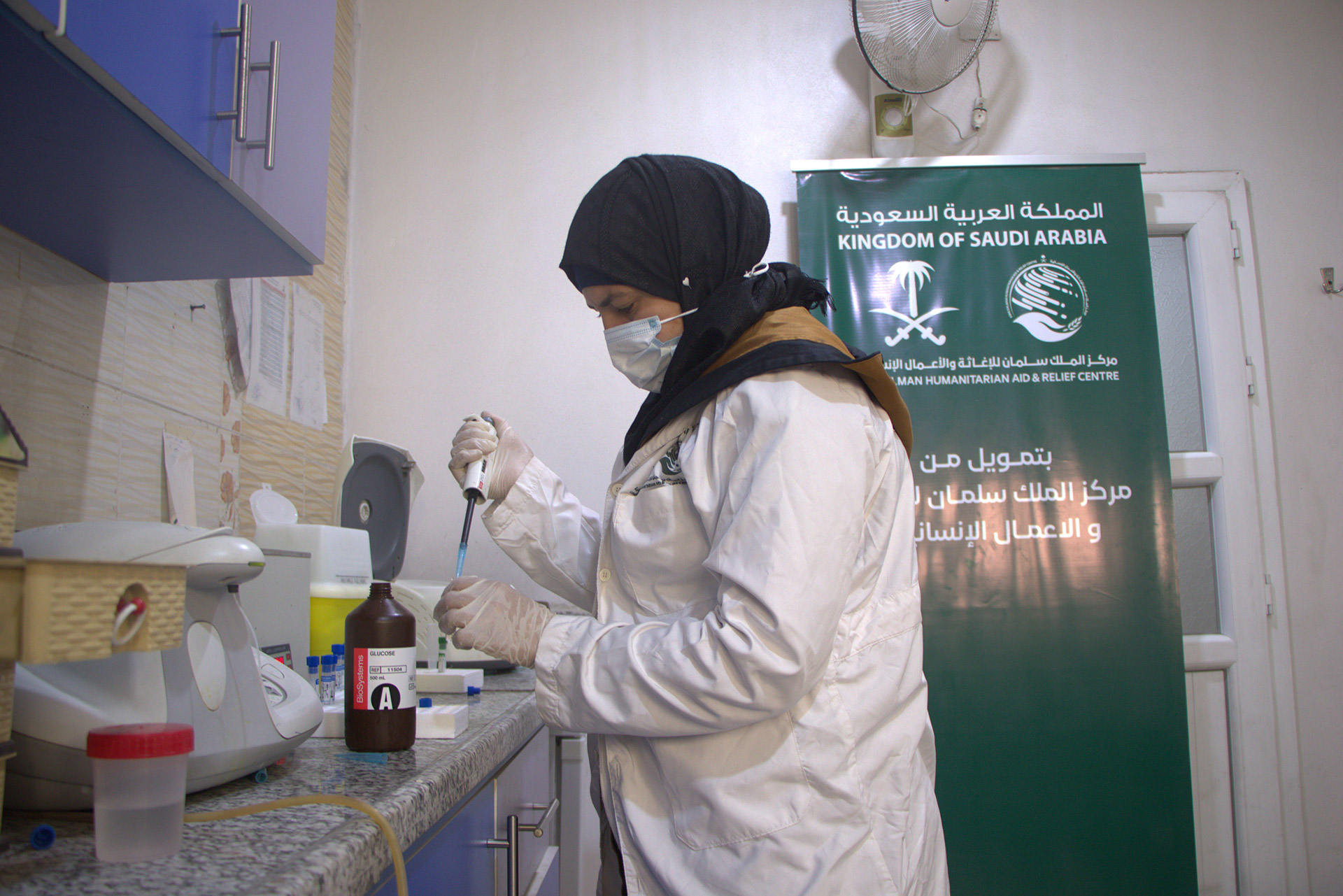 Maryam Ahmad Al-Khalaf prepares a blood sample inside the laboratory at Al-Bab Health Centre in eastern Aleppo. Photo credit: WHO
Maryam Ahmad Al-Khalaf prepares a blood sample inside the laboratory at Al-Bab Health Centre in eastern Aleppo. Photo credit: WHO
Maryam was displaced from Deir Hafer several years ago and rebuilt her life in Al-Bab, where she now lives with her husband and three children. “This community became home for us,” she says. “Working here is my way of giving something back.”
As the centre’s laboratory technician, Maryam performs the full range of tests requested by doctors and midwives – from basic blood counts and blood glucose tests to infection markers that help identify conditions requiring urgent attention. These results guide nearly every clinical decision in the centre, making the laboratory a quiet but essential part of primary health care.
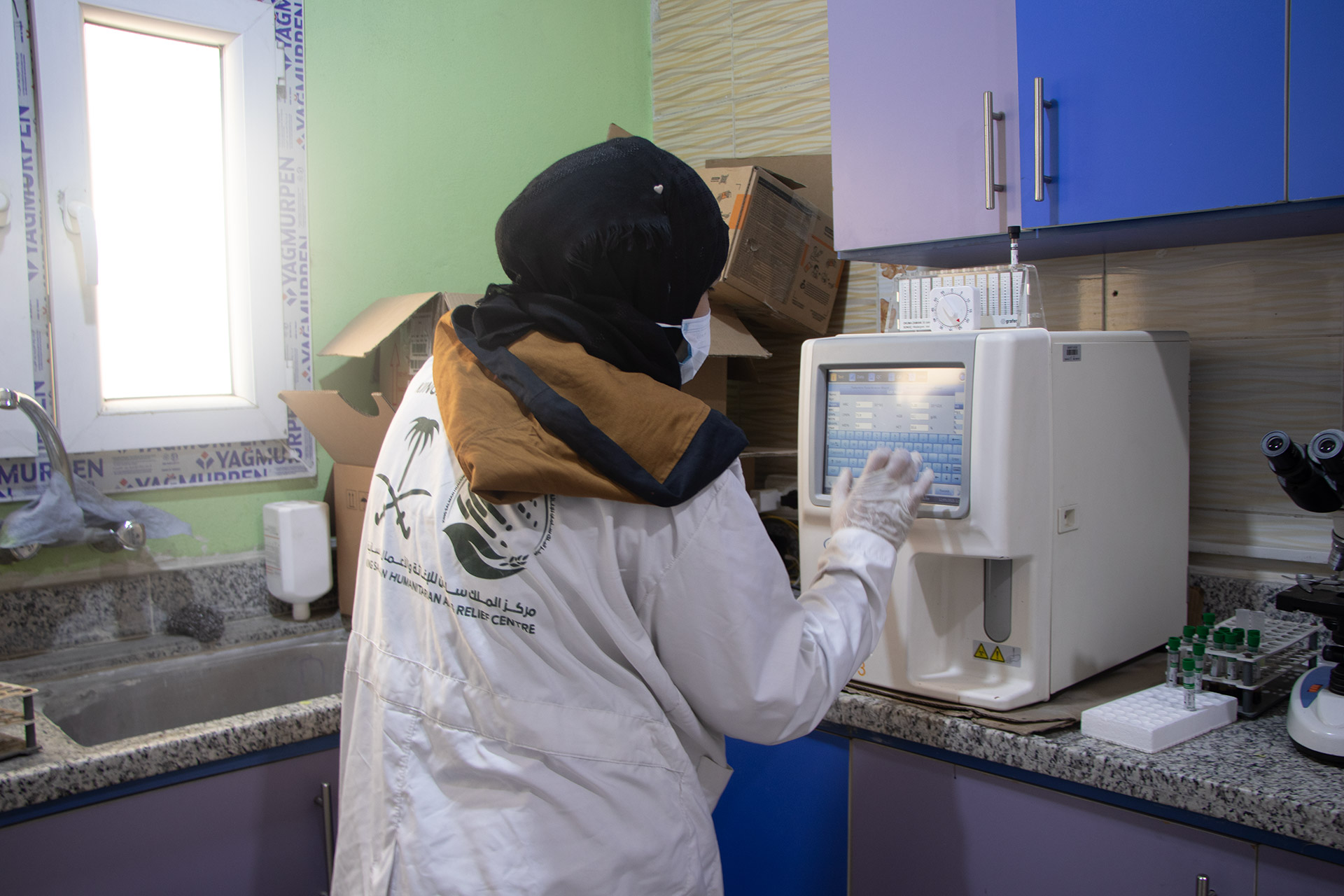 Maryam reviews laboratory results at Al-Bab Health Centre. Photo credit: WHO
Maryam reviews laboratory results at Al-Bab Health Centre. Photo credit: WHO
Clinicians speak openly about how much they rely on her work. With limited resources and high patient loads, accurate diagnostics are the foundation of safe care. “Her results help us make the right decisions for our patients,” says one of the centre’s doctors. “In many cases, the lab findings determine whether someone can be treated here, needs referral, or requires close follow-up to prevent complications.”
The services at Al-Bab Health Centre are delivered in coordination with the Ministry of Health and implemented on the ground through Alameen Organization whose teams ensure that essential health care remains available to communities with limited options.
Since late 2024, continued support from the King Salman Humanitarian Aid and Relief Centre (KSrelief) has helped WHO keep 50 health facilities operational across northwest Syria, including Al-Bab. This contribution has ensured uninterrupted access to primary, secondary, and specialized services – from essential medicines and supplies to dialysis care, which remains a growing need in the region.
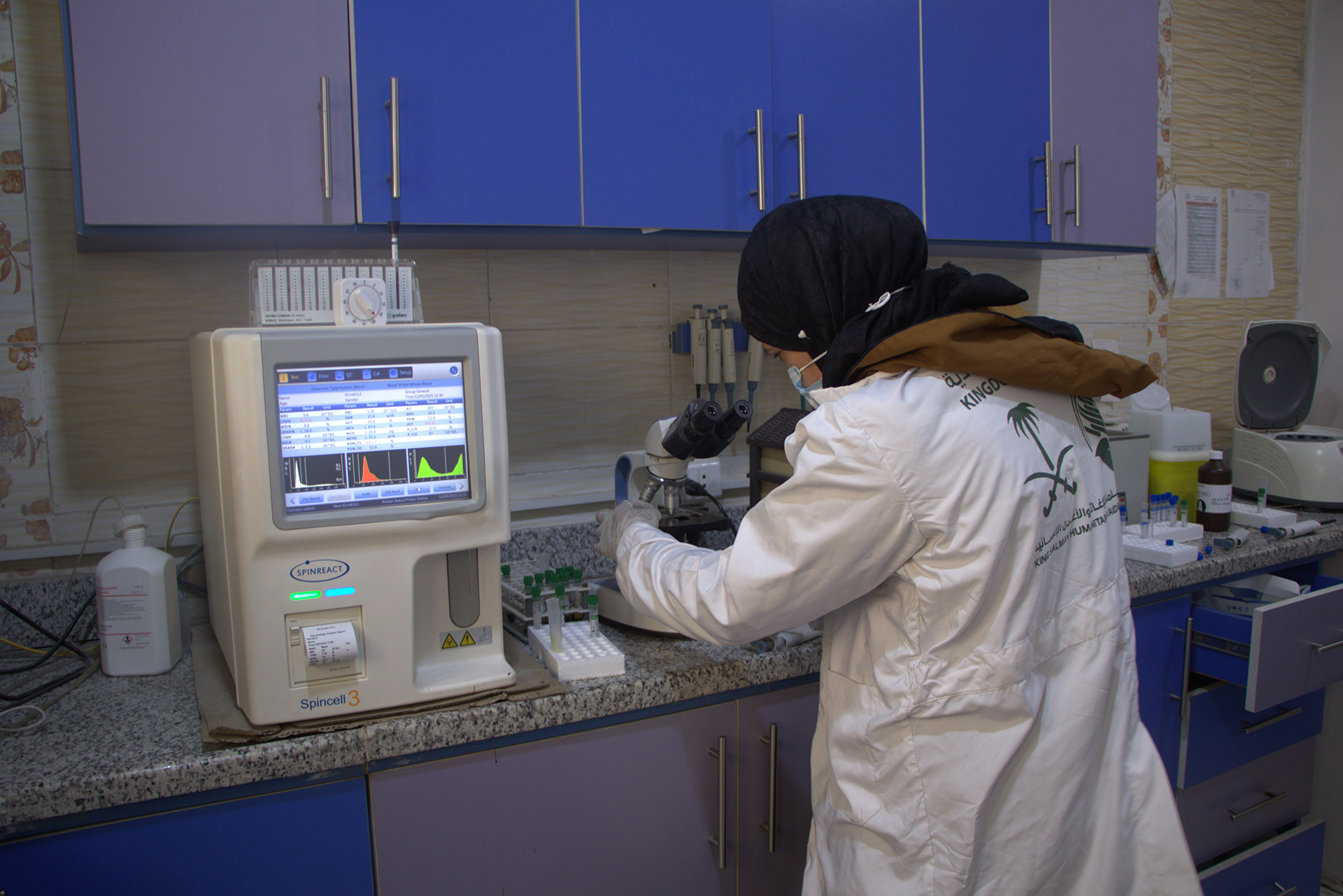 Maryam conducts microscopy work inside the laboratory at Al-Bab Health Centre. Photo credit: WHO
Maryam conducts microscopy work inside the laboratory at Al-Bab Health Centre. Photo credit: WHO
For Maryam, this stability is what allows her to serve people with dignity. “When the centre has what it needs, we can focus fully on patients,” she explains. “A single test result can change someone’s treatment plan. Reliable services mean we can detect issues early, before they become dangerous.”
And as she reflects on the support that keeps her laboratory functioning, she adds: “People here depend on these services. The support we receive helps us continue our work without interruption – and that means families get answers and care when they need it most.”
In Al-Bab, where health services play a vital role in daily life, Maryam’s work ensures families receive timely, quality care close to home – so no one must forgo essential diagnostic testing.
Families returning home join Syria’s Big Catch-Up to protect every child
13 November 2025 – Damascus, Syrian Arab Republic - At Barzeh Al-Balad Health Centre in Damascus, 35-year-old Yousra smiles as she holds her daughter’s newly issued vaccination card. “It feels good to be back home and to know my children are protected,” she says.
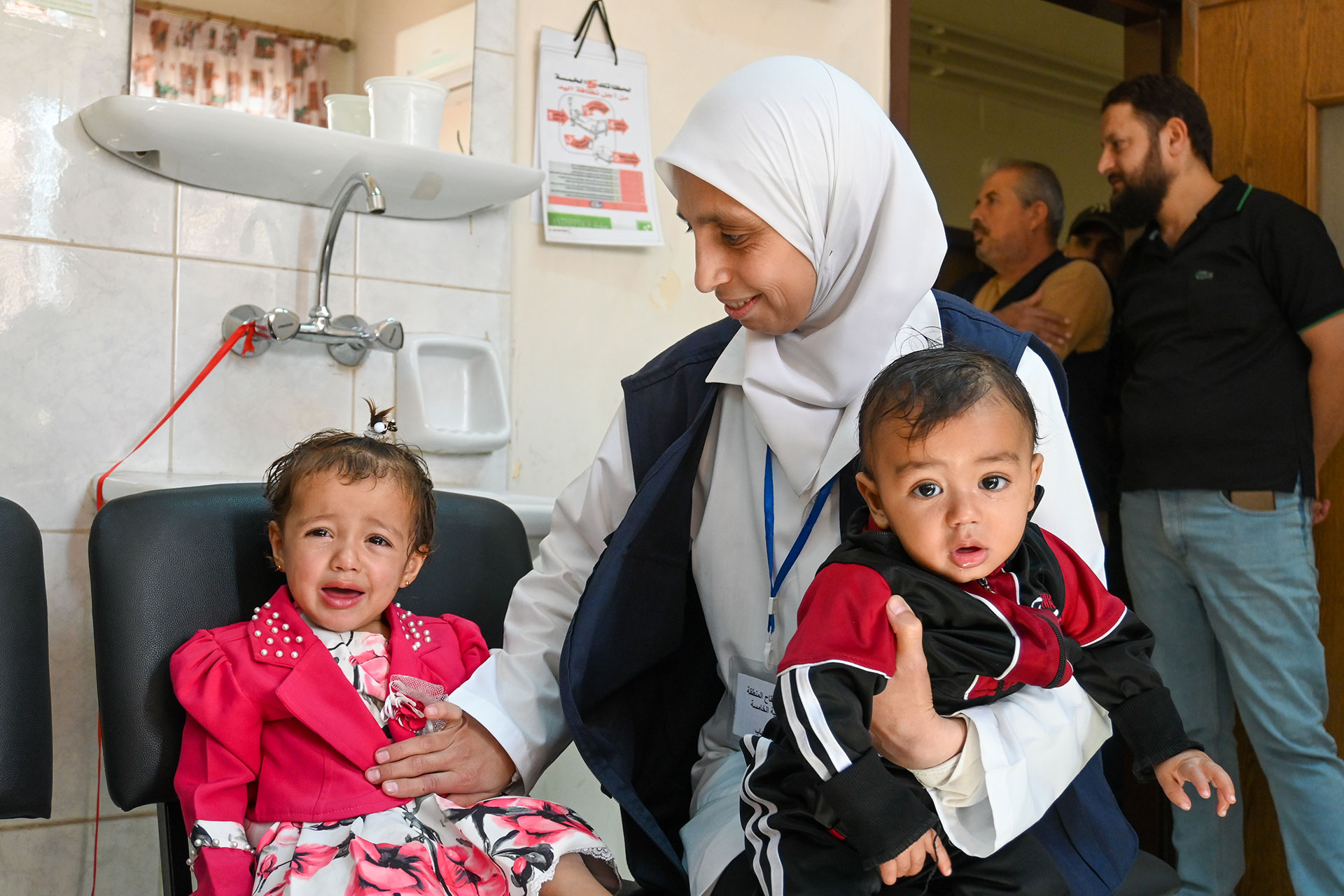 Miriam Chehab, a vaccination officer, comforts Yousra’s children after they received their routine vaccines at Barzeh Al-Balad Health Centre in Damascus. Photo credit: WHO
Miriam Chehab, a vaccination officer, comforts Yousra’s children after they received their routine vaccines at Barzeh Al-Balad Health Centre in Damascus. Photo credit: WHO
Yousra returned to Syria a month ago after nearly a decade in Lebanon. During her years of displacement, she struggled to keep up with her children’s vaccination schedule. Frequent moves and limited access to services meant her two-year-old daughter, Lyn Saleh Al-Akklah, missed several routine doses.
“When we came back, I didn’t know where to start,” she recalls. “Then one day, a community health worker approached me in the market and told me about the national catch-up campaign. I brought my children the next morning.”
At the centre, nurses reviewed her vaccination card from Lebanon and updated it with the vaccines Lyn had missed. “The team was kind and patient,” Yousra says. “They explained each vaccine and scheduled the next visit. I felt reassured.”
Now pregnant with her third child, she says resuming vaccinations is part of starting over. “After so many years abroad, I finally feel settled. I want my children to grow up healthy here in Syria.”
Continuing care for families
Across Damascus, parents like Aisha Mohammed are also ensuring their children are protected.
At Masaken Barzeh Health Centre, seven-year-old Lyn Mohammad Semaan Al-Zoubi continues to receive her vaccines on schedule. The centre is close to their home, and her mother, Aisha, regularly brings her follow-up appointments.
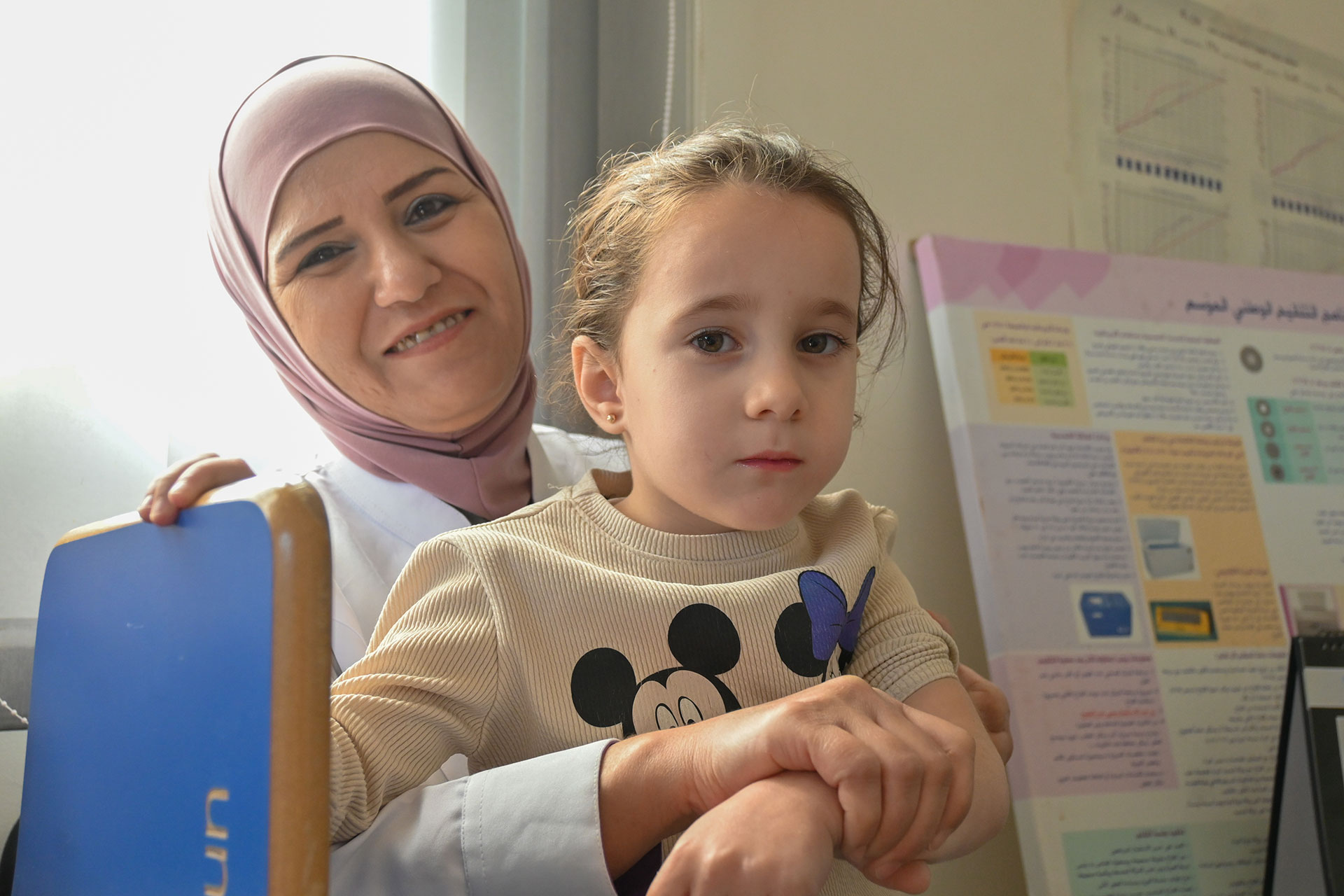 A vaccination officer in Damascus, holds seven-year-old Lyn Saleh Al-Akklah after checking her vaccination status at Barzeh Al-Balad Health Centre. Photo credit: WHO
A vaccination officer in Damascus, holds seven-year-old Lyn Saleh Al-Akklah after checking her vaccination status at Barzeh Al-Balad Health Centre. Photo credit: WHO
The surrounding neighbourhood was heavily damaged during the conflict, but the rehabilitated health centre has remained an anchor for families seeking consistent care. Supported by the Ministry of Health, the centre has been part of wider national efforts to restore essential health services and strengthen routine immunization. “The nurses know my daughter and always take time to explain,” Aisha says. “It feels safe and familiar — I know she is protected.”
Reaching every child
Supervising these efforts is Miriam Chehab, a vaccination officer managing five health centres across the district. She has worked in the Expanded Programme on Immunization since 2012.
“I’ve seen families returning after displacement and others who never left but kept coming regularly,” she says. “This year we are seeing more awareness and trust.”
To reach hesitant parents, vaccination teams rely on dialogue and outreach. “We work with volunteers and community health workers in markets, schools and places of worship,” she explains. “Mobile teams also help reach families who cannot travel to health centres.”
Reaching these areas is not always easy. In As-Sweida, for instance, teams had to navigate mountainous terrain and remote villages amidst a volatile security situation to reach children who had missed their vaccines. Despite the challenges, they managed to reach over 15,700 children across the governorate — many of them in hard-to-access communities where health services remain limited.
 A health worker administers an oral polio vaccine to a young girl during a door-to-door outreach activity in Damascus. Photo credit: WHO
A health worker administers an oral polio vaccine to a young girl during a door-to-door outreach activity in Damascus. Photo credit: WHO
Miriam hopes the progress seen during the Big Catch-Up will strengthen routine immunization nationwide. “As Syria rebuilds, our goal is not just to recover what was lost, but to make the system stronger – so every child can be reached on time.”
Families like Yousra’s and Aisha’s are among hundreds of thousands across Syria who have benefited from the nationwide Big Catch-Up campaign, led by the Ministry of Health with support from WHO, UNICEF and Gavi, the Vaccine Alliance.
The activity covered 13 governorates, with an ongoing measles rubella vaccination campaign in northern Aleppo and Idlib from 2 to 13 November 2025. To date, health workers have screened the vaccination status of over 1.7 million children under five and vaccinated over 270,000 of them. Around 15,500 children had never received any vaccine — all have now been reached. In parallel, more than 1.6 million children received the measles, mumps and rubella vaccine and vitamin A supplements.








